

Today, our nation and society are confronted with large-scale challenges, both on the international and domestic arena. Russia is rich not only in natural resources, but also in talents, we possess a unique cultural heritage, an immense science and technical potential. We can do everything, inter alia something that no one else can do, except us: we can build spacecraft, nuclear power plants and hypersonic missiles. We can carry out grandiose projects that have geostrategic significance, for instance, such as the Crimean bridge or the FIFA World Cup – the best throughout its history.
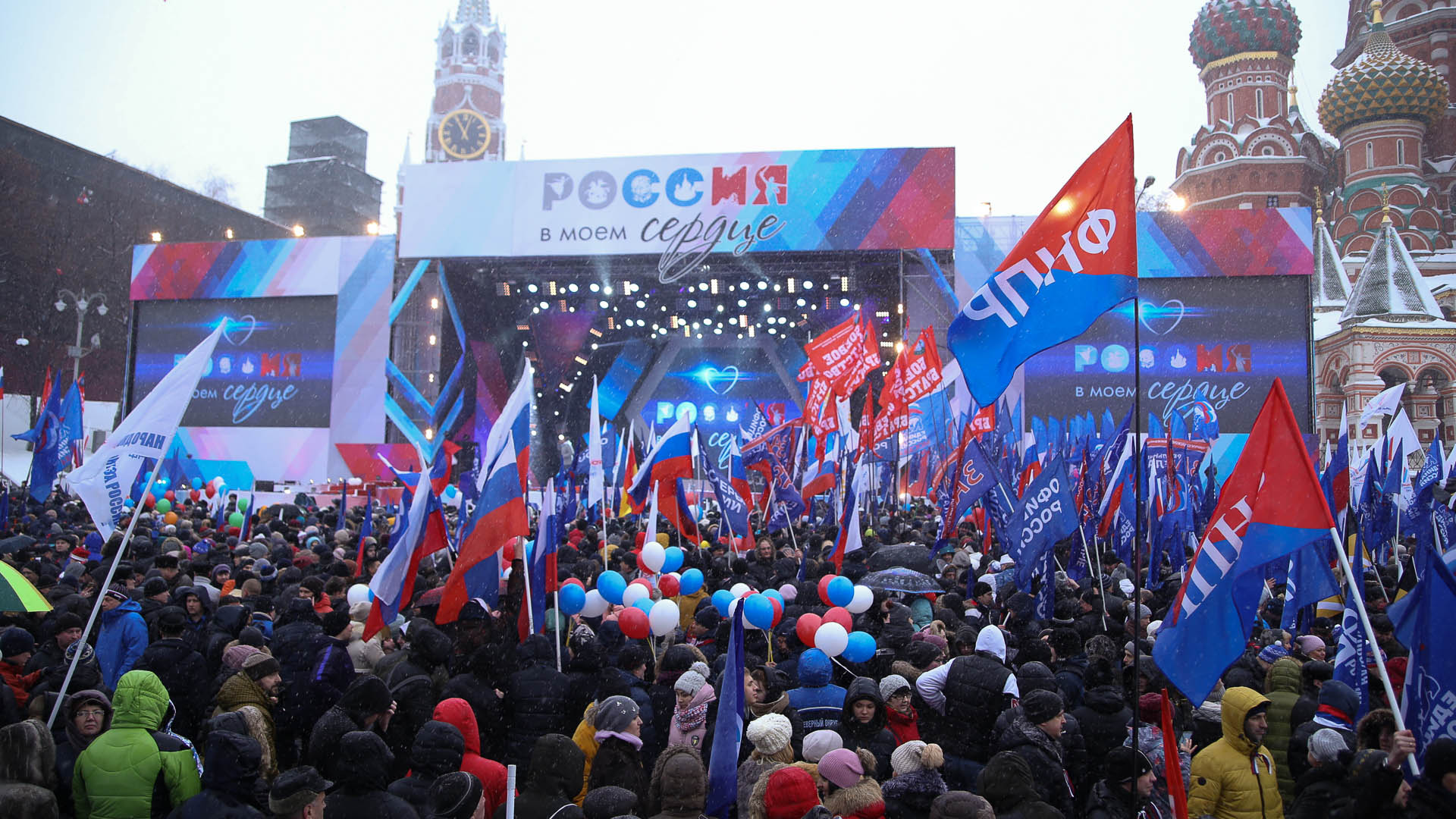
Being in possession of such wealth, we ought to secure decent living standards for all citizens of our great country.
RUSSIA IS RICH NOT ONLY IN NATURAL RESOURCES, BUT ALSO IN TALENTS, WE POSSESS A UNIQUE CULTURAL HERITAGE, AN IMMENSE SCIENCE AND TECHNICAL POTENTIAL.
Public opinion polls indicate that Russian citizens are currently concerned with social injustice, inequality and poverty most of all. Our country is ranked to be the third among 82 nations in terms of regional inequality and it is one of the three leaders in terms of inequality of the constituent regions within the country among the European and Central Asian states, Russia also holds one of the top places in the world in terms of inequality in wealth distribution. More than half of all Russian citizens have no savings at all2 Toward a New Social Contract // World Bank, 2018: https://openknowledge.worldbank.org/bitstream/handle/10986/30393/9781464813535.pdf?sequence=10.. Most certainly, it cannot be denied that inequality is a global problem.
On the other hand, the primary criterion for the assessment of the performance of the government authorities at all levels has acquired a moral dimension. It is related to the fact that Russian civil society has become stronger. A series of recent scandals – similar to the offensive remarks made by the government functionaries followed by their discharge from the office – show that noticeable changes have taken place in society: the standards of tolerance toward injustice and boorish behavior have been considerably lowered. The basis for such change in the social atmosphere has been provided by growing trust among citizens toward each other, their readiness to protect the common interests.
An important prerequisite for such a change in the public atmosphere was social consolidation, a patriotic upsurge - the very “post-Crimean consensus” that has not disappeared anywhere today. The fundamental values of social consolidation remain the traditional values of Russians: Motherland, Freedom, Justice. It is the adherence to these values, with all the diversity and inconsistency of their current interpretations and understanding, that significantly increases the moral and ethical sensitivity of Russian society.
The task of civil society structures in the framework of a “mutually responsible partnership” is to prevent and, if necessary, oppose the power of bureaucracy. The appropriate expertise is needed as part of public scrutiny. It is intended to become a necessary part of the regulatory impact assessment of regulatory acts, the practice of actions of the authorities at all levels.
It is impossible to radically improve the living standards in our country without the engagement of active representatives of civil society and just ordinary people at the local level. It can be often heard that citizens are not sufficiently competent to participate in the discussion and in the control of management decisions. Some sociologists have asserted that the public discussion of the injustice and inequality issue is fraught with risks, as it may give rise to the explosion of populism, which will impede the introduction of reforms. As if only the elite knew which reforms should be carried out, and the citizens were totally unaware of it.
However, such an approach is profoundly wicked. As a matter of fact, the ultimate goal of the transformations is a dignified life of a person. People experience the fallout over the decision-making – whether positive or negative – not in theory, they find out the hard way.
One of the priority projects pursued by the Civic Chamber of the Russian Federation – the Community Forums in the Russian regions – is designed to promote a broad discussion of the urgent agenda facing civil society, including individual complaints and also concrete proposals and projects. In 2018, over 200 thematic discussions were held within the framework of eight forums, they were attended by almost 15,000 people.
During one of the field trips, the members of the Civic Chamber inspected the new building of a regional Civic Chamber after a thorough refurbishment. Indeed, it looked neat and attractive on the outside. However, the representatives of local public organizations noticed that the new entrance ramp that was put in place as a result of refurbishment was absolutely unfit for the needs of disabled persons, in contrast to the old one, and the people in wheelchairs would have great difficulty to enter the building. One could explain for hours on end that the most “innovative” and “breakthrough” technologies were used in the construction, but if the people say that the situation was now worse than before, then their opinion cannot be ignored anyway. Of course, the citizens have to deal with more serious problems. For example, when new residential compounds are built, but the development plan does not envisage the construction of a kindergarten, school, outpatient clinic, or when the social infrastructure facilities envisaged under the plan are not built at all – this eventually leads to social conflicts.
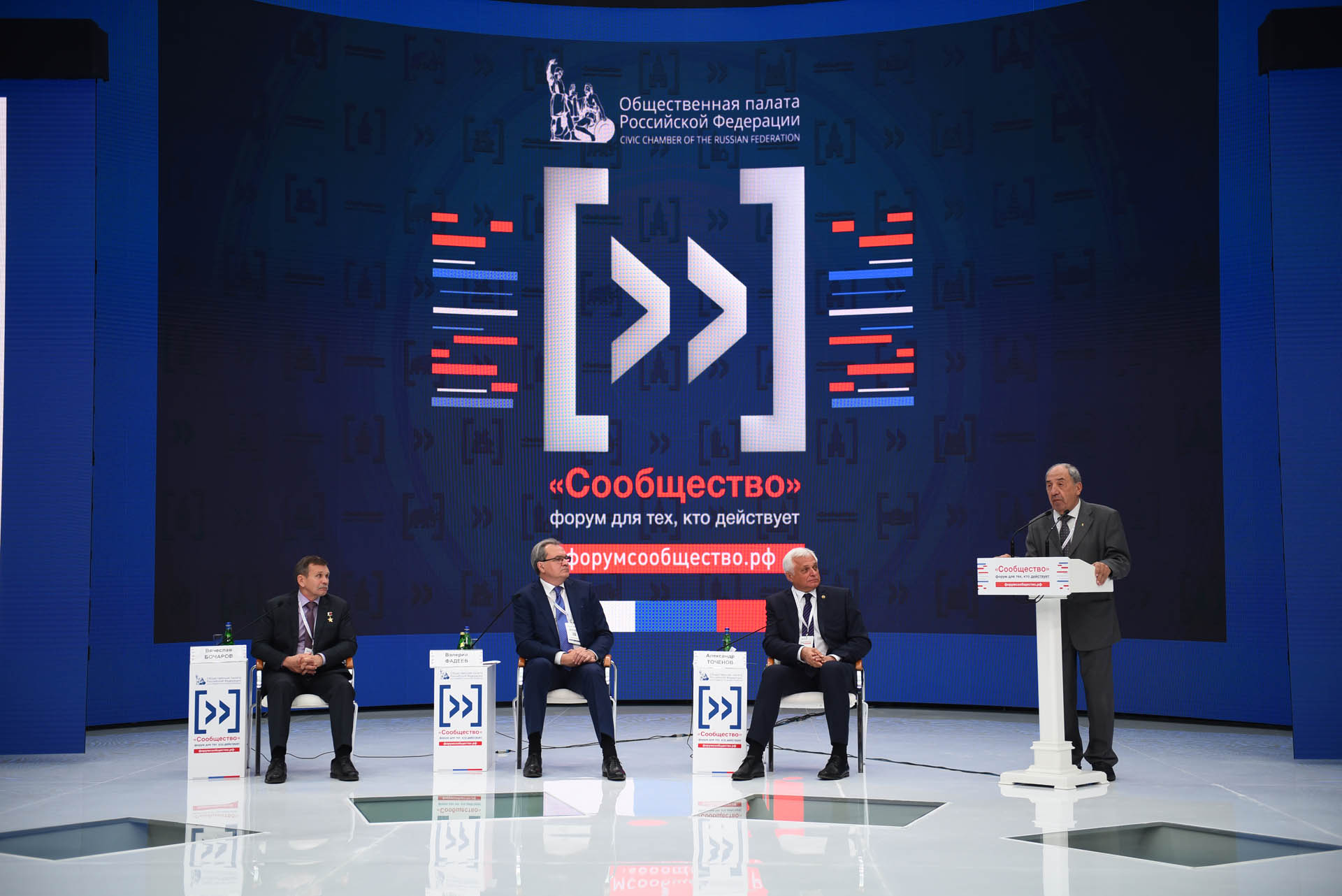
It is vital to perform the checking “on the ground” of large-scale strategic projects which have an impact on the living standards of thousands of our citizens. At the “Community” Forum in the Far Eastern federal region, the social activists paid attention to the condition of the port of Nakhodka. The city gained the status of a free port and was soon transformed into a coal haulage hub. In its turn, this resulted in the closure of traditional production plants, disruption of the existing technological chains, emergence of environmental problems – even the actual loss of the main local sight, the sand beach. This was followed by a migration drain of the population, as the people were made redundant and deprived of their traditional living environment. Yes, the free port status affords certain economic profitability, but the final objective of all changes should be the improvement of the quality of life for the people. Yet, in this case, the developments have taken an opposite area.
In this respect, people are very competent to make a judgment, and often it is not even appropriate to implement massive projects without such “popular” review. Moreover, this idea was explicitly articulated by Russian President Vladimir Putin: “Ultimately, the most important thing is the real positive changes in the life of each person, each Russian family. And for us, this is precisely that matters, what we need is the result, and we want people to see that the cities, for example, and the villages are becoming more comfortable and convenient, the new roads are built, we want to make sure that the operation of kindergartens, schools, hospitals, social sector, overall, is changing for the better, the social and municipal services can be made available easily, without standing in a queue – this is a matter of importance. Let me repeat, it is extremely important to establish a feedback mechanism, to coordinate our steps with the interests of the people, to do everything possible to get them directly involved in our development projects”3 Meeting of the Council for Strategic Development and National Projects // Russian President Website, 24.10.2018: http://kremlin.ru/events/councils/by-council/1029/58894..
The task for the elite is to embrace the real values and strivings of the people and, proceeding from that, to formulate pragmatic operational goals and objectives so that the entire society could understand and accept those goals and objectives. Thus, a consolidation of efforts occurs in the context of development objectives, and the community becomes united, and the state is robust. According to the Russian President, we need “efforts intended to unite people, to consolidate the work of civil society and the state – what our predecessors called “common wisdom”, “common experience”4 Meeting of the World Russian People’s Council // Russian President Website, 01.11.2018: http://kremlin.ru/events/president/news/59013..
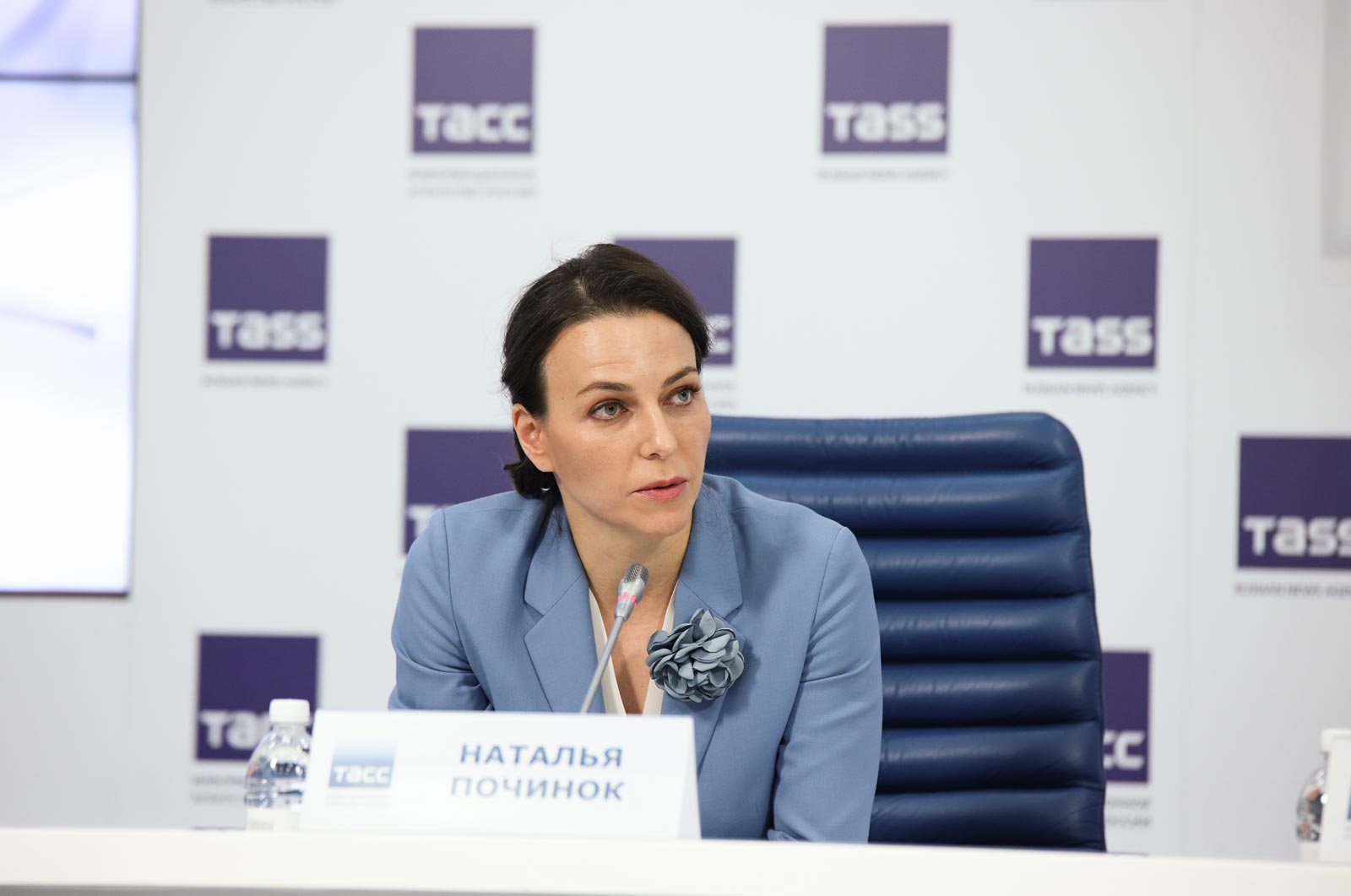
The trust is formed primarily through the engagement of citizens in the formulation, implementation and monitoring of decisions that directly affect the quality of life and the future of children. In this regard, we have serious achievements, but there are many examples of a purely bureaucratic approach, attempts to impose the so-called unpopular decisions on society.
A bad example was the model of pension reform, which was traditionally bureaucratic and presented to the population as a fait accompli. It is not surprising that people reacted negatively: judging by opinion polls, citizens do not believe in an increase in pensions after the reform and see the meaning of all the changes that the state wants to make older people work longer and withdraw their well-earned pensions. It is clear that such a public atmosphere, in its turn, promotes the growth of mistrust. In this situation, the Civic Chamber of the Russian Federation saw its main mission in bringing the concerns of citizens to the attention of the executive branch. Following the special meeting at the site of the Chamber, 27 questions were posed to the Government5 The Civic Chamber of the Russian Federation prepared 27 questions to the Government of the Russian Federation on the future of the pension system//Website of the Public Chamber of the Russian Federation, 10.07.2018: https://www.oprf.ru/press/news/2018/newsitem/45954. concerning labor discrimination, problems of regional labor markets, advanced training and vocational guidance for people of middle and old age, labor migrants, the situation of families with children, youth unemployment, etc.6 The future of the pension system: expert opinions and public//Website of the Civic Chamber of the Russian Federation, 19.07.2018: https://www.oprf.ru/press/news/2018/newsitem/45811.. The Ministry of Labor and Social Protection substantiated the Government’s position on the need to raise the retirement age, provided calculations showing how the economy and citizens would benefit from new parameters of the pension system, presented a plan of measures to protect the labor rights of citizens of pre-retirement age. In August 2018, the President of Russia made a direct appeal to citizens, in which he proposed to correct the initial norms of the draft law. These proposals and the final version of the bill reflected many proposals of the community.

Another large – scale project is public monitoring of the presidential election in Russia – showed a huge constructive potential of public-state partnership and civil self-organization. In accordance with the Federal law No. 374-FZ as of December 5, 2017 on amendments to the Federal Law on the election of the President of the Russian Federation, the Civic Chamber of the Russian Federation and the civic chambers of the regions have been granted the right to send observers independent from political parties to monitor the electoral process at the polling stations. At the request of the Civic Chamber of the Russian Federation and public chambers in the regions, the election was monitored by 1866 federal, regional and municipal public organizations from all regions of Russia and about 150 thousand observers. In fact, in a few months a new significant public institution was created, initiated by civil society and supported by a new legislative framework. It was the efforts of citizens, rather than impersonal means of control, that significantly increased the legitimacy of the election and put a barrier to manipulation.
The potential of civil society is clearly revealed in the engagement of socially oriented non-profit organizations in the provision of social services to the population. The engagement of NPOs in the provision of social services to the public sector is a way to increase contest and improve the quality of social services. The NPOs have obvious advantages: creative attitude to business, for many it is a labor of love, and sometimes an innovative laboratory that develops new approaches to the provision of services.
Visible results have been achieved in this area that we lacked even a few years ago. But there are also gaps mentioned by representatives of socially oriented NPOs (SO NPOs) at the “Community” Forums in the regions. In the first place, no billing system was developed for new types of services provided by the NPO to the population. In some regions the transfer of services to SO NPO was done via re-registration of the state (municipal) organizations to non-profit ones, which is contrary to the very idea underlying the project. This issue was discussed at the “Community” Forums in all federal districts. A number of proposals and recommendations were developed for the executive authorities aimed at facilitating access to the social services market and improving competitive conditions.
The growth of public activity has manifested itself in the development of volunteerism. 2018 was declared the Year of Volunteer in Russia. Thanks to their activity, the World Cup was held at the highest level in our country. The guests left home after it feeling love for Russia. On the other hand, in addition to event volunteering, there were a lot of important volunteer initiatives in the country, where people help to search for missing children or transport food to elderly people in remote villages on a regular basis. Yet, such volunteers rarely participate in official events and discussions, they are often not even registered, and therefore they are hardly taken into account by statistical observation.
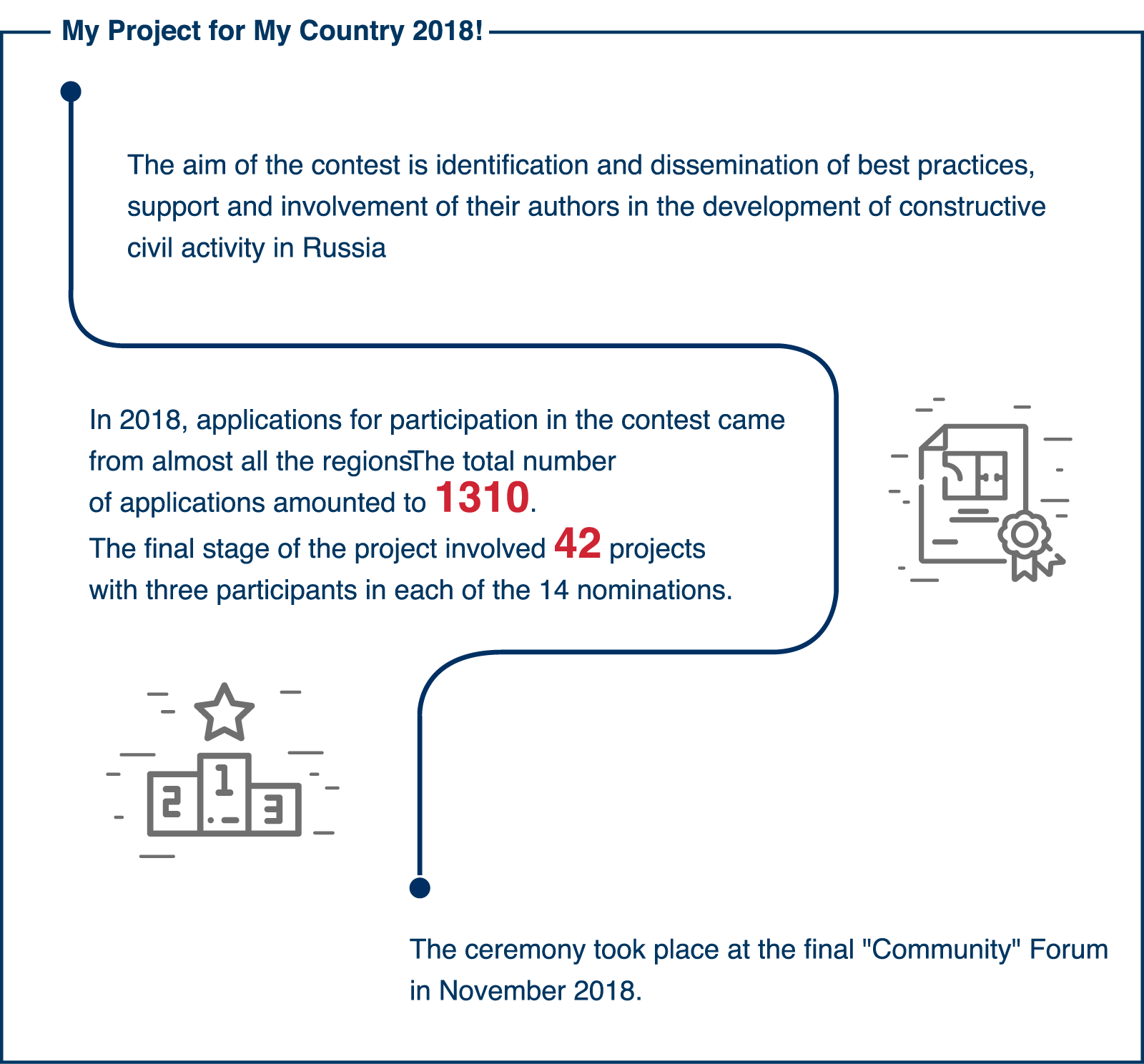
Social Care. Social Services and Social Support Lyudmila Nikonova, “Golden Hour” (training senior people of the older generation in first aid skills), Saransk
Support Sports and Healthy Lifestyles. Health Protection and Healthy Lifestyle Promotion David Martirosyan, “Match of equal opportunities”, Krasnoyarsk
Family, Motherhood and Childhood Support. Family, Motherhood and Childhood Support and Traditional Family Values Protection Sophia Efanova, “Small Houses from a Large Family”, Lipetsk Region, Krutye Khutora village.
Youth Policy. Youth Initiatives Support Ekaterina Antonova, “Love Surprise”, Rostov-on-Don
Science and Education. Science, Education and Awareness Development Valeria Asafova, “Street of Childhood”, Perm
Culture. Projects in the Area of Culture, Art and Cultural Heritage Preservation Larisa Abasheva, “Theatre-Studio” ORA (Life), Yekaterinburg
Basic Rights and Freedoms. Human and Civil Rights and Freedom Protection Alexander Ternovtsov, “Pravomobil”, Kursk
Ecology. Ecology and Environmental Protection Alexey Sitnin, “Where the garbage goes” - a system of public monitoring of removal and disposal of municipal solid waste (MSW), Moscow
Interethnic Relations. Strengthening Interethnic and Interfaith Accord Yana Belova, “Cultural, educational and integration center “Migrant School”, Khanty-Mansiysk
People’s Diplomacy. Public Diplomacy Development and Compatriots Support Victor Golubev, international educational project “Skazkoteka” (Tales of Russia to children of Russia and Germany), Kaliningrad
Civic Duty. Patriotic Education and Historical Memory Preservation Alina Atamanenko, “Regional Award” People's Hero”, Omsk
Volunteering and Charity. Charity and Volunteering Initiatives Alla Osipova, Social charitable program “Helping Hand”, Kaliningrad
NPOs infrastructure, Promotion of Non-Profit Sector and Socially Focused NPOs Development Anastasia Maskayeva, “Prevention of emotional burnout - Second Breath”, St. Petersburg
Public Control. Public Control over Governmental and Local Administration Activities Alexey Poleshchuk, “Kaluga regional portal of civil initiatives” KALUGA-GOLOS”, Kaluga Region, Kuibyshevsky District, village Lopatino7 List of winners of the contest “My Project-My Country”// Website of the project “My Project-My Country”, 04.11.2018: https://xn--80ajbsqcgidjkb.xn--p1ai/files/%D0%9F%D0%BE%D0%B1%D0%B5%D0%B4%D0%B8%D1%82%D0%B5%D0%BB%D0%B8.pdf.
The main task for the coming years is the implementation of national projects identified in the May Decree of the President of Russia. Ambitious goals have been set. Their achievement will enable our country to make an economic breakthrough and a noticeable improvement in living standards. It is necessary to clearly understand: national priorities are not just a matter of public administration technology, but a social and political issue that concerns all citizens of Russia.
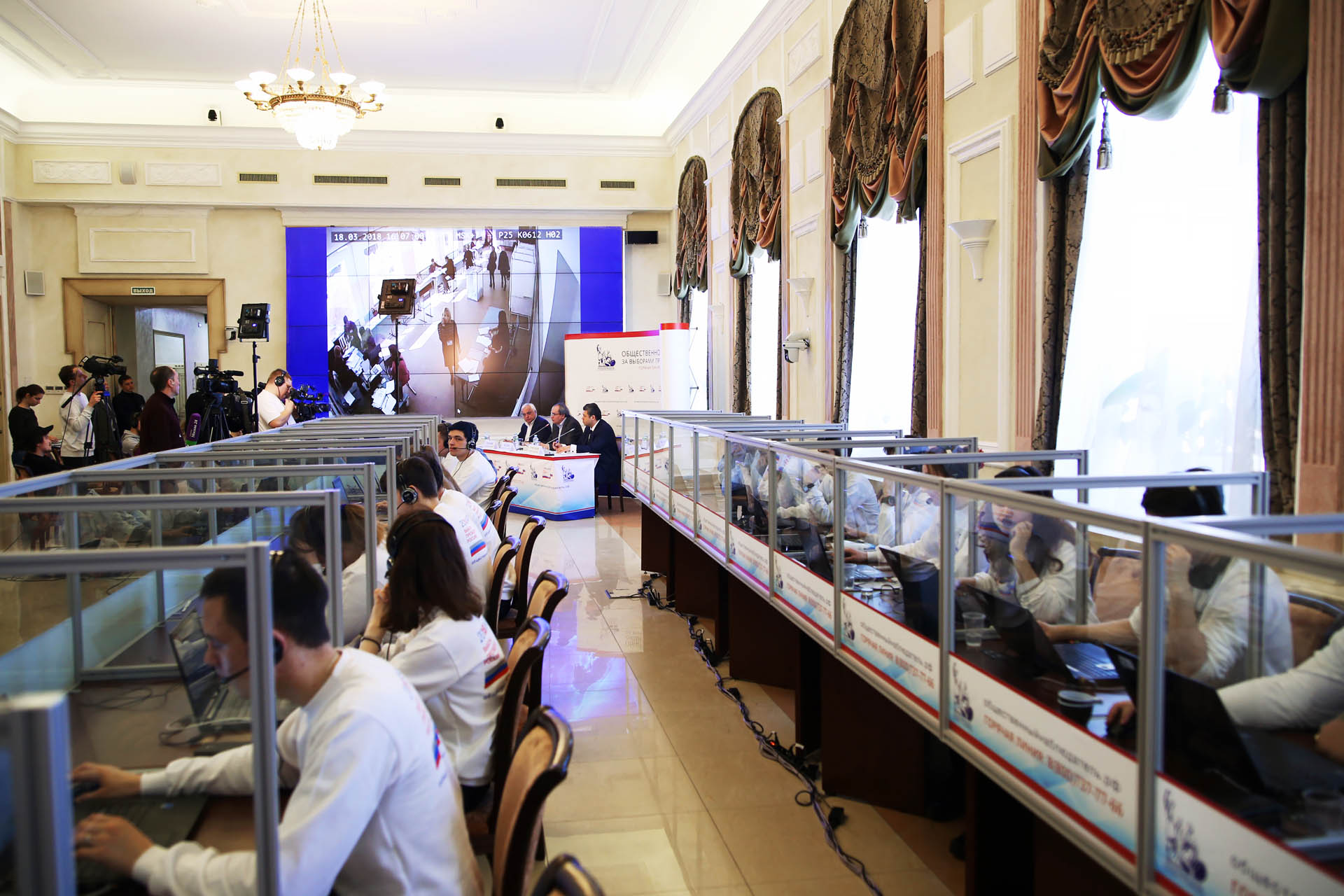
Therefore, while carrying out national projects, it is impossible to focus only on formal numbers and schedules, the main thing is to take into account the interests and values of people. This is what the President of Russia said in his address to citizens after winning the March elections: “All the upcoming decisions, even the most difficult ones, will be dictated by only one thing – the need to overcome the backlog that still exists in some areas, to ensure the dynamic development of the country and a new quality of life of people, to respond to the historical challenges that we face. And most importantly, any of these decisions will ultimately be made solely in the interests of our country, our citizens, for the sake of our children and future generations”8 Address to the citizens of Russia/Russian President Website 23.03.2018: http://kremlin.ru/events/president/news/57121..
Therefore, the role of civil society in carrying out national projects today is more crucial than ever. Only society can push the bureaucracy to those decisions that take into account the interests of people at the local level, and then to implement public control over the adopted decisions. This was directly said by the President of Russia: “We need substantial control, essential control. It is impossible to replace real business by bureaucratic reports, and nominal performance of orders, as it sometimes still happens”9 Meeting of the Council for strategic development and national projects // Russian President Website, 24.10.2018: http://www.kremlin.ru/events/councils/58894..
The engagement of civil society is not limited to control, it comes with its own initiatives, projects that should be seamlessly taken into account in managerial decisions. It is obvious that the departmental programs often lack a living thought and breakthroughs, while negative scenarios are often not considered, and a real public expertise, sociological surveys are not carried out.
A breakthrough can be achieved only in the context of public consolidation around development goals, which is possible in an atmosphere of trust and mutual understanding between civil society and the state. This consolidation means not only the creation broad public support for the goals and objectives of the “Russian breakthrough”, resisting the “fear traders” and populists who spread discord and mistrust instead of constructive criticism. Consolidation is a condition for strengthening the All-Russian unity. The norms, values and ideas that consolidate the majority of our society are practically necessary to increase the efficiency of the entire system of institutions that need public support to this end; integration of public interests that can overcome departmental, corporate and regional lobbyism. The discussion of these issues, as well as the development of the foundations of a broad public consensus and substantive platform of public consolidation will be promoted by the project the Civic Chamber of the Russian Federation “All-Russian Unity. What unites us”10 We need national consolidation and common moral values — Iosif Diskin // Website of the Civic Chamber of the Russian Federation, 03.11.2018: https://www.oprf.ru/press/news/2018/newsitem/47196?fbclid=IwAR1_-X1ETzztMQRazy6XqKCfMRm-HjEMOVLb_eO3d5Lmzci_D7YdMGFgEgc..
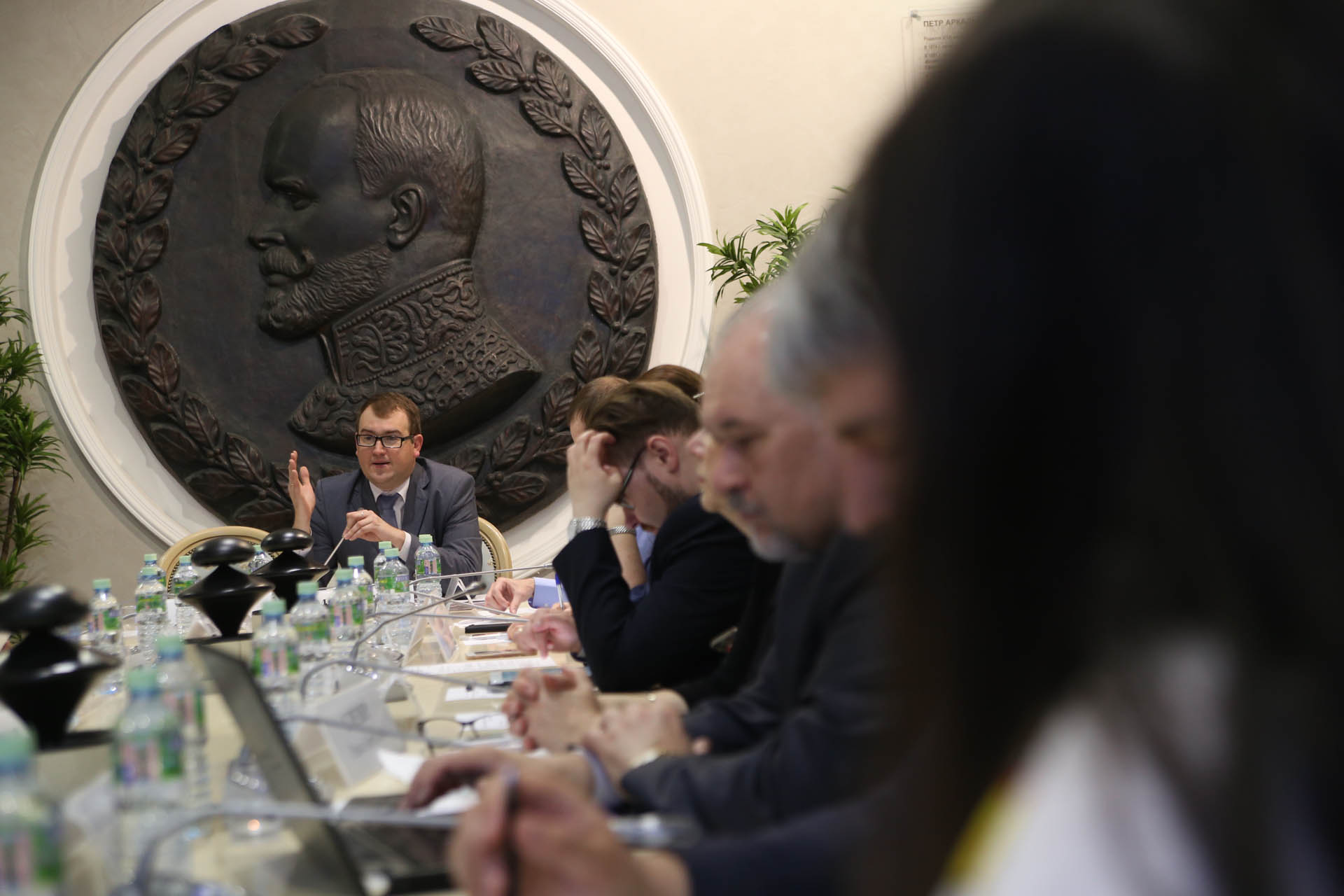
Within the framework of solving the “Russian breakthrough” issues, the Civic Chamber of the Russian Federation sees its role in the following:
The Civic Chamber sees its mission in contributing to constructive dialogue with state authorities, in helping civil society to articulate its interests, arranging them into specific realizable projects. Our goal is to form a public demand for development policy, to strengthen not the formal bureaucratic, but the informative technology of civic engagement in this policy. Thus, it is not only about monitoring the implementation of managerial decisions already taken, but also about moving towards creating various elements of public administration at the local, regional and federal levels.
This experience gradually accumulates and there are successful examples of engagement of civil society in shaping the concept of national projects.
In the regions, the main sites of the public-state dialogue are the civic chambers. In the conditions, when the public demand for upholding their interests is growing significantly, civic chambers and councils in the regions get a chance for more active development – as discussion platforms, in which positions of the parties on controversial issues are discussed and agreed. Civic Chamber exists, primarily, to ensure the interaction of individuals and their associations with the authorities. To this end, a number of regional civic chambers have created special platforms for such interaction. Here are just a few examples. The Civic Chamber of Leningrad Region launched the People’s Expertise11 People’s Expertise portal: http://народнаяэкспертиза.рф/. portal so that the residents of the region could report on various problems, promptly receive answers and track the progress of feedback consideration. The role of the people’s overseers in solving the problems is entrusted to the municipal civic chambers of the region. The Civic Chamber of Kaluga Region runs a portal of civil initiatives KALUGA-GOLOS12 Kaluga regional portal of civil initiatives., where you can not only report problems for their further addressed by the portal to specialized authorities, but also tell about the good deeds of ordinary people, about efficient practices of NPO and civil society activists.
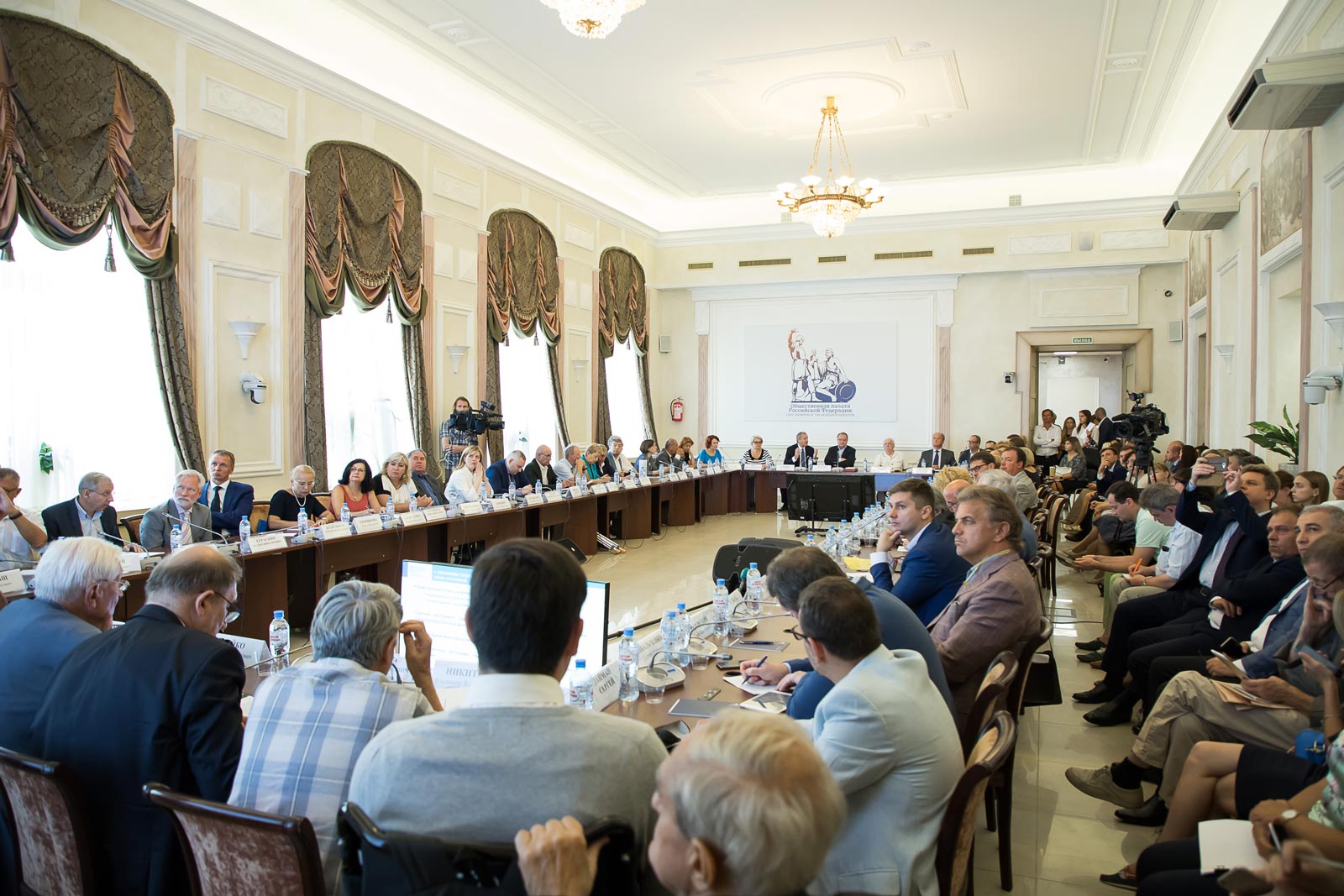
Today, these institutions are also involved in the examination of bills, carry out public scrutiny, are involved in the formation of regional public councils. In some subject regions of the Federation, Civic chambers are vested with the right of legislative initiative.
Civic chambers in the regions have a serious potential that showed the system of public supervision at the election. Today, the main task of the Civic Chamber of the Russian Federation and civic chambers in the regions is to set the content technology of civic engagement in the discussion and implementation of national projects. Here is the data of a fresh public opinion poll. Should the civic chambers participate in monitoring the implementation of the most important presidential decrees, for example, the May Decree? 49.4% of respondents say: yes, they should participate, and only 7% think that they should not. People expect that the civic chambers will take an active part in the implementation of national projects - both in the form of public control and through the promotion of fresh ideas and decisions that always appear among active citizens13 “Implementation of national projects is a matter of the entire nation, not just bureaucracy —Valery Fadeev//Website of the Civic Chamber of the Russian Federation, 02.11.2-18: https://www.oprf.ru/press/news/2018/newsitem/4717..
In this regard, the Council of Civic Chambers of the Regions decided to create ad hoc working groups whose task would be to monitor the implementation of national projects. The engagement in the implementation of the May Decree is a priority in the activities of civic chambers for the coming years. At the meeting of the council, the chairmen of regional civic chambers described their experience of participating in the discussion of national projects. So, the Chairman of the Civic Chamber of Vologda Region Olga Danilova has informed colleagues that all members of the chamber are included in the working groups on various aspects of national projects and participate in harmonization of national projects passports. The Chairperson of the Civic Chamber of Novosibirsk Region Galina Gridneva reported on the active engagement of public figures in the discussion of national projects: an inter-commission working group on the May Decree of the President works in the region, which analyzes the situation and reports the results at the expanded sessions.
The “Community” Forum of active citizens in the federal districts showed that in the regions there are many civil activists and not just indifferent citizens ready for a constructive dialogue with the authorities. It is important to more actively involve such people in the work of civic chambers, public councils under the executive authorities in the regions, public monitoring committees.
Urbanist and former member of the Civic Chamber of the Russian Federation Vyacheslav Glazychev used to say “How can a territory develop? This is a person that can develop through his/her activity and life in the territory”14 We need this quality instrument that will support the society and business — Valery Fadeev//Website of the Civic Chamber of the Russian Federation, 28.08.2018: https://www.oprf.ru/press/news/2018/newsitem/46369.. The main thing is to create modern comfortable living conditions regardless of the place of residence. The Civic Chamber believes this approach to development to be the only right one. Meanwhile, in departmental programs, the basic factors are often ignored.
Spatial Development Strategy is formally targeted at the solution of these problems15 Draft spatial development strategy of Russia ending 2025 // Ministry of economic development Website: http://economy.gov.ru/minec/activity/sections/planning/sd/201817081.. Public hearings on the document to the Civic Chamber of the Russian Federation showed that the draft strategy is detached from the needs of people at the local level and is focused solely on growth points including large metropolitan areas, commodity or agricultural development zones. At the same time the project ignores middle and small towns, rural settlements. The proposed draft of the territory strategy is evaluated only from retrospective positions and does not take into account their potential. The regions themselves do not agree with the specialization and division into 14 macro-regions imposed on them. Moreover, the draft strategy completely ignores middle and small towns, rural settlements16 “We need this quality instrument that will support the society and business — Valery Fadeev//Website of the Civic Chamber of the Russian Federation, 28.08.2018: https://www.oprf.ru/press/news/2018/newsitem/46369.. The document lacks clear goals and indicators of their achievement, does not describe the mechanisms for implementing the strategy, including financial ones, lacks data on the development prospects of some areas (for example, in the power section there is no information about the associated water infrastructure; in the agriculture section attention is paid only to grain, but there is nothing said about animal husbandry, etc.), there is no unifying idea for the subject regions of the Russian Federation.
It is obvious that without a broad public debate, such documents should not be accepted. The Civic Chamber of the Russian Federation is ready to become an expert network platform, working with regional experts in Moscow and in the subject regions of the Federation to discuss region-specific development projects.
The development of the country is possible only through the development of the province. The Civic Chamber of the Russian Federation sees this development through the creation and maintenance of competitive advantages of the territories – it is necessary to formulate mechanisms to support such projects throughout the country17 “Problems of small towns is the lack of investment, insufficient attention” — Andrey Maksimov//Website of the Civic Chamber of the Russian Federation, 28.05.2018: https://www.oprf.ru/press/news/2018/newsitem/45554..
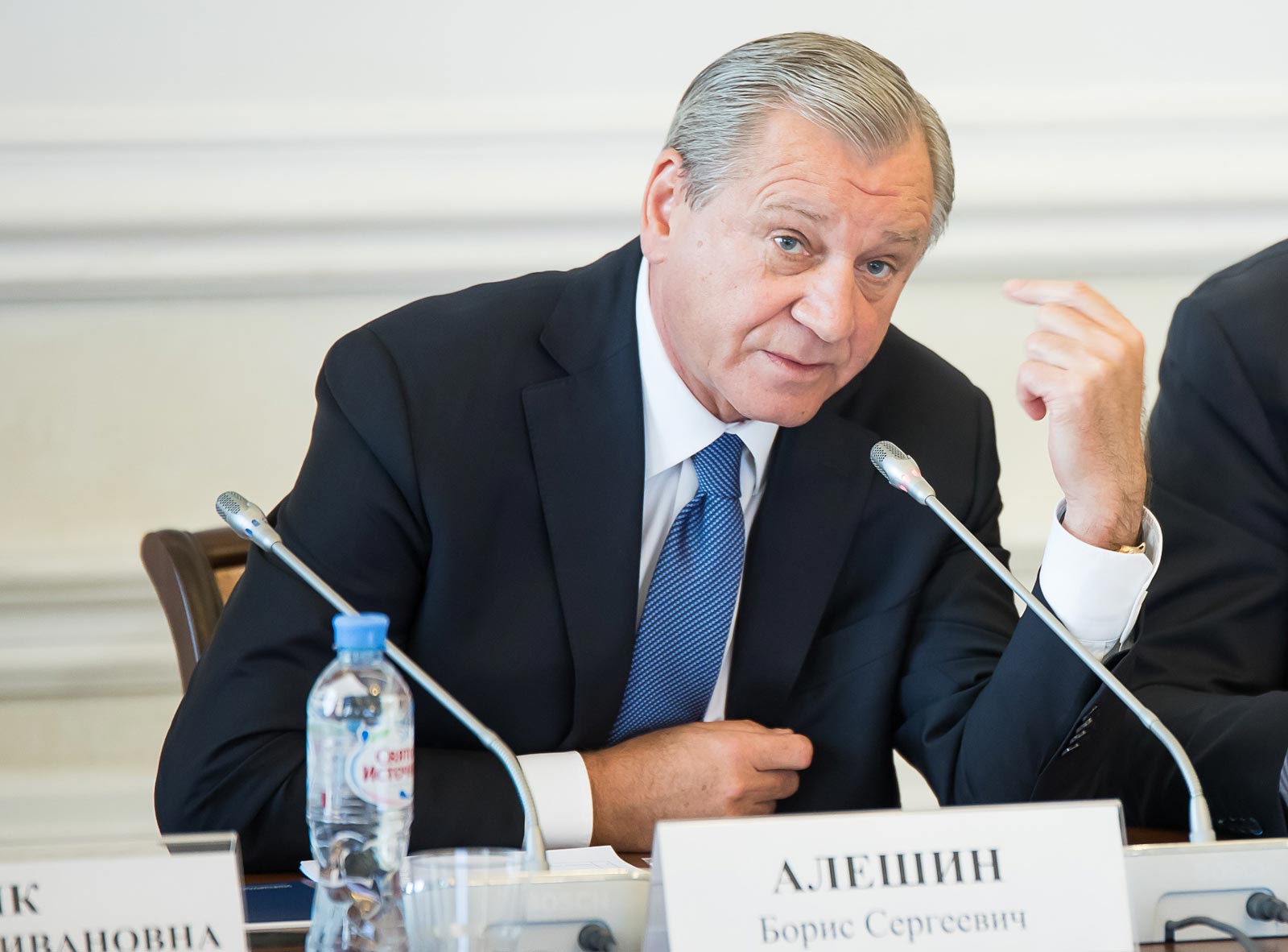
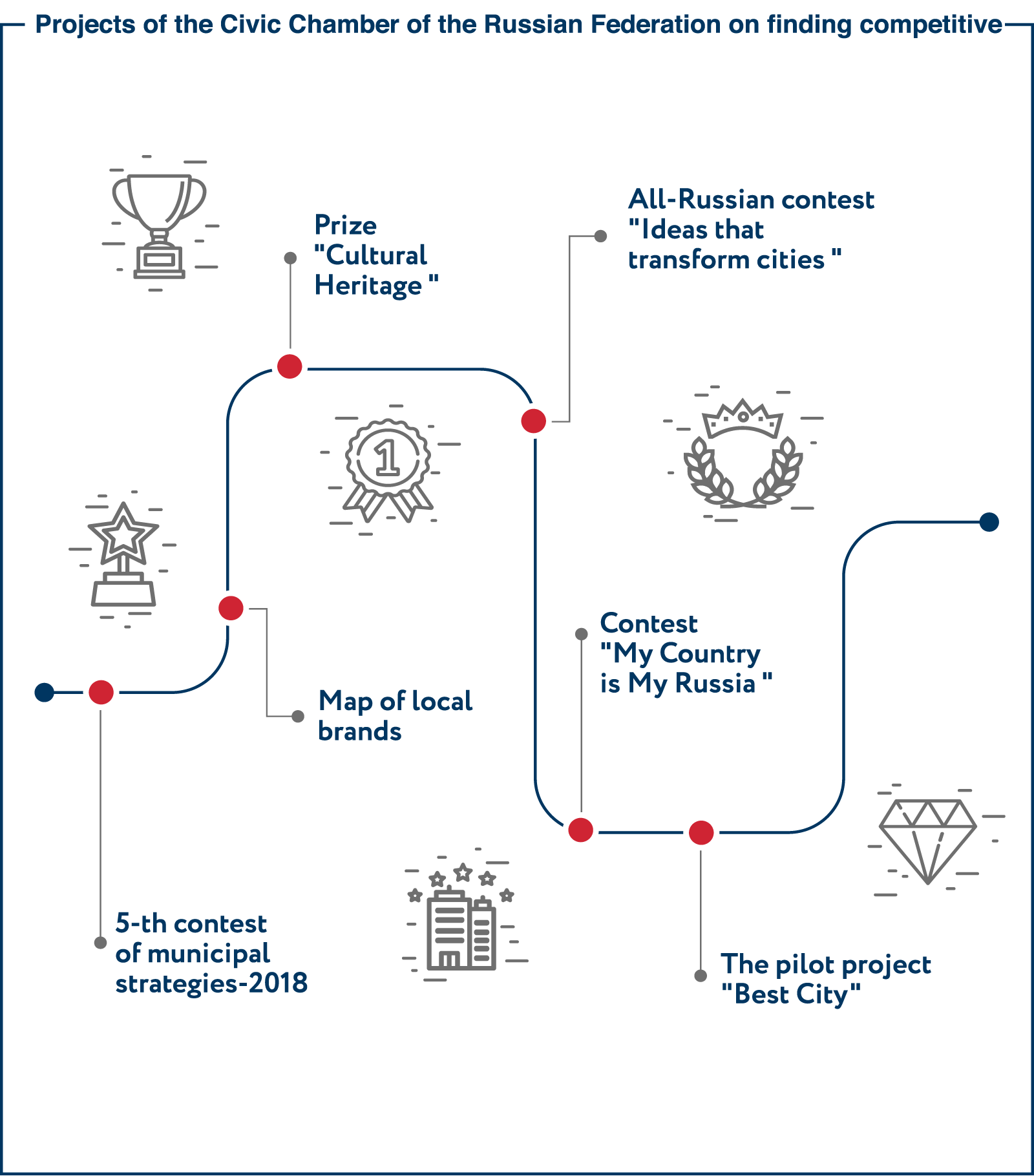 18 “Crystal column for those, who preserve the cultural heritage of Russia//Website of the Civic Chamber of the Russian Federation, 30.05.2018: https://www.oprf.ru/press/news/2018/newsitem/45493. 19 “My Country is My Russia”: results of the contest for 2018 year//Website of the Civic Chamber of the Russian Federation, 27.06.2018: https://www.oprf.ru/press/news/2018/newsitem/45817; “My village” is an immense topic, a huge field for creativity” — Yevgeniya Uvarkina/Website of the Civic Chamber of the Russian Federation, 29.05.2018: https://www.oprf.ru/press/news/2018/newsitem/45435. 20 “Ideas that transform cities”: young urbanists and architects presented their projects//Website of the Civic Chamber of the Russian Federation, 20.07.2018: https://www.oprf.ru/press/news/2018/newsitem/46066. 21 The future of cities is in the hands of society: Civic Chamber of the Russian Federation, announces start of municipal contest strategies//Website of the Civic Chamber of the Russian Federation, 04.06.2018: https://www.oprf.ru/press/news/2018/newsitem/45530.
18 “Crystal column for those, who preserve the cultural heritage of Russia//Website of the Civic Chamber of the Russian Federation, 30.05.2018: https://www.oprf.ru/press/news/2018/newsitem/45493. 19 “My Country is My Russia”: results of the contest for 2018 year//Website of the Civic Chamber of the Russian Federation, 27.06.2018: https://www.oprf.ru/press/news/2018/newsitem/45817; “My village” is an immense topic, a huge field for creativity” — Yevgeniya Uvarkina/Website of the Civic Chamber of the Russian Federation, 29.05.2018: https://www.oprf.ru/press/news/2018/newsitem/45435. 20 “Ideas that transform cities”: young urbanists and architects presented their projects//Website of the Civic Chamber of the Russian Federation, 20.07.2018: https://www.oprf.ru/press/news/2018/newsitem/46066. 21 The future of cities is in the hands of society: Civic Chamber of the Russian Federation, announces start of municipal contest strategies//Website of the Civic Chamber of the Russian Federation, 04.06.2018: https://www.oprf.ru/press/news/2018/newsitem/45530. Different types of comfortable environment should be developed for different territories. Typical solutions are not applicable to territories of different size and type. In this regard, it is necessary to develop a classification of territories and, depending on the type of territory, propose ITS development programs.
The Civic Chamber of the Russian Federation pays special attention to the situation in small towns and rural areas. In recent years, our country can boast of record harvests and grain exports. But the quality of life in the village does not improve, people leave, the gaps in the level of well-being in cities, small towns and villages extend. According to the 2010 All-Russian Population Census, more than 10% of villages in Russia do not have permanent residents, and in most of the “living” rural settlements the number of inhabitants does not exceed 50 people, 36 thousand villages have less than ten people22 Village: the land does not feed, the forest feeds // So It Goes, 23.01.2018: https://takiedela.ru/2018/01/takaya-rossiya-derevnya-zemlya-ne-kormit/.. Over the years, the situation has aggravated.
People leave their residence for two reasons. First of all, it is, of course, lack of work. Secondly, the disorder of life and infrastructure degradation. Only 35% of the villages have a central water supply system and 5% have sewerage23 Village: the land does not feed, the forest feeds // So It Goes, 23.01.2018: https://takiedela.ru/2018/01/takaya-rossiya-derevnya-zemlya-ne-kormit/.. Approximately 20 thousand rural schools have been closed in Russia since 200124 Map of communities//Russian reporter, no. 19 (458), September 24-October 8- page 8.. The situation with the availability of medical institutions in rural areas and libraries deteriorates. Obviously, it has not yet been possible to revitalize the territories with the help of the existing support systems, including grants to beginning farmers.
Endangered and abandoned village is a road to nowhere, and the potential of rural areas is great. The Civic Chamber of the Russian Federation has argued for several years now it has been said that the causes of rural degradation are largely due to the fact that in the management culture all indicators of rural development are linked to macroeconomic indicators and the development of large agricultural holdings. Meanwhile, those goals that could contribute to the consolidation of people in rural areas are completely absent. The main thing for this is the creation of modern comfortable living conditions regardless of the place of residence. We are talking about intuitive and simple things: basic infrastructure (water, electricity, gas, sewerage, roads, public transport), social sites (school, kindergarten, polyclinics), leisure space. The village comes to life in places, where the state creates such conditions, and there are such successful examples in the country.
At the final “Community” Forum in Moscow, there was a presentation of villages of Belgorod Region, where they refer mainly to the quality of life in the country. Paved roads, manicured parks, public buildings, modern educational facilities, quality houses. In Krasnodar Territory, local activists with the support of the Legislative Assembly of the Territory and the Territory Civic Chamber for the Sustainable Development of Rural Areas have created a resource center “Development of rural (agrarian) tourism in the Krasnodar Territory”, where representatives of rural territories and local communities are taught how to attract tourists25 Necessary conditions for the further development of the Park of South Russia Program // Village. Resources. Opportunities: http://www.saitselo.com/436338691.. Similar projects will provide for the growth of consumption and the growth of economy, including at the expense of interesting projects in the field of rural tourism. People, who have stable incomes and purchasing power, are the main customers of local small and medium-sized businesses.
We all need to work that there were many more such examples of the revival of rural life. It requires strategic management decisions that will improve the rural infrastructure. The Civic Chamber of the Russian Federation receives persistent complaints of citizens on the lack of ability to connect to gas networks. It is time to take decisions obliging the heads of the subject regions of the Federation, in case of availability of gas distribution stations, to ensure the construction of street gas networks in settlements so that owners had an opportunity to obtain technical conditions for joining the gas pipeline located at a distance of up to 200 meters.
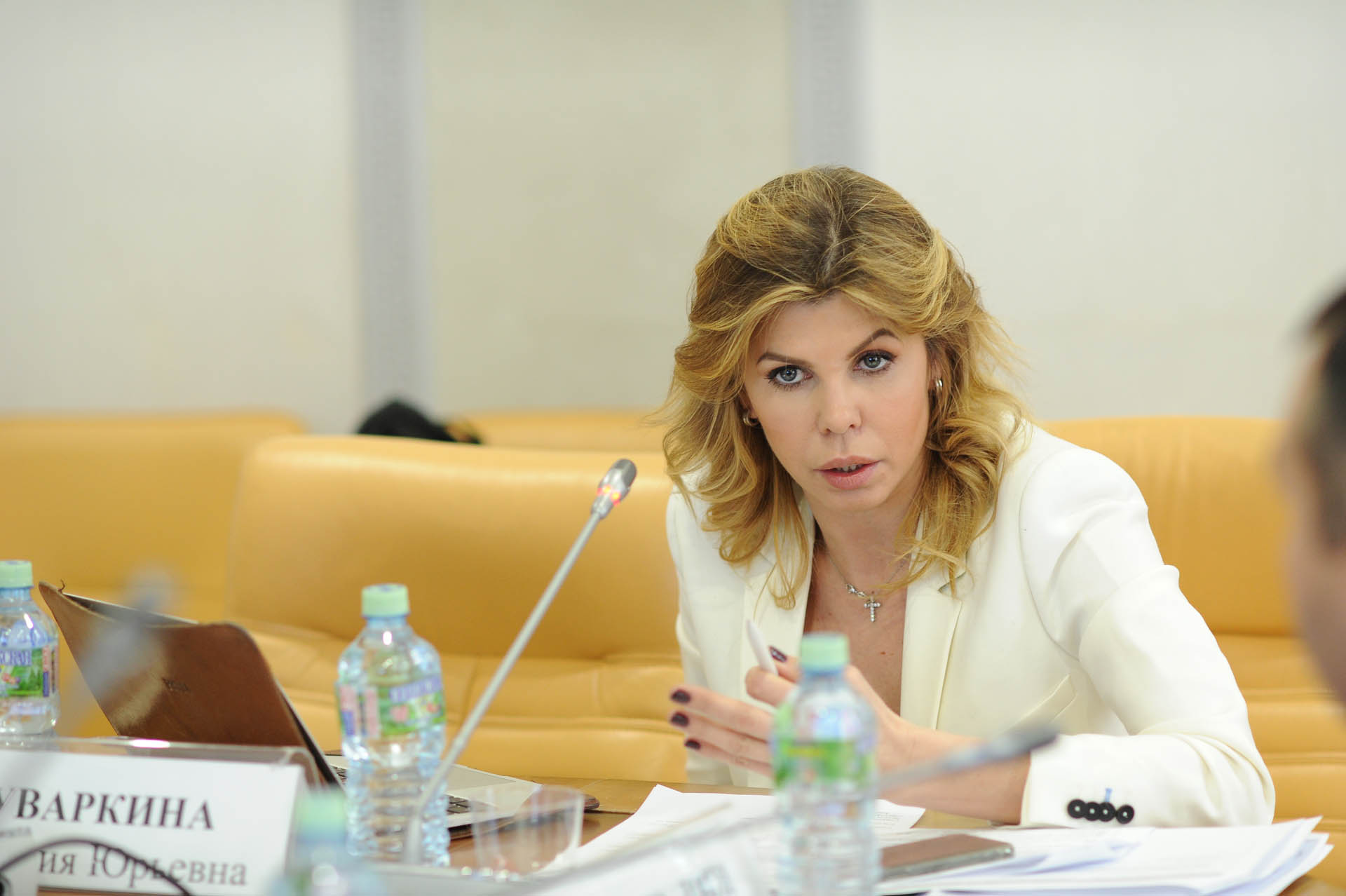
It is important to review the priorities of the development of the road network. In recent years, a large amount of work on road construction has been performed, but it relates to the federal highway network, which stretches along 50 thousand km and for which 500 billion rubles has been allocated. Regional and municipal roads comprise 1.5 million sq km and the same amount was allocated for their maintenance. In order to bring the roads up to 50% of the normative state, it is necessary to increase the amount of funds allocated for the construction, maintenance and repair of the regional and local road network.
The Civic Chamber of the Russian Federation, jointly with the All-Russian Association of passengers, monitored the transport accessibility of small towns in several regions. Problems were identified in the bus service. In some cases, the regional governments are ready to buy buses and launch routes, but there is no quality roadway, in other regions there are no buses.
There are regions where there is no clear understanding of what areas need new bus routes. The problem should be solved point-by-point, taking into account the characteristics of each region. With the support of the Government of the Russian Federation, the commercial leasing program should be expanded.
Also in 2018, the Civic Chamber of the Russian Federation jointly with the Russian Union of rural youth carried out monitoring and began to form a public standard for the accessibility of social and engineering infrastructure in rural settlements named “Standard of the Village”. The problem is not only that many villages do not have social sites, but on the basis of existing regulations, it is difficult to justify their necessity. The standard assumes the division of rural settlements into five categories-by the number of inhabitants: up to 100, up to 2000, up to 5 000, up to 10 000 people and more, and the requirements are set in such areas as Availability of social facilities”, “Availability of trade organizations, consumer services, leisure”, “Availability of engineering infrastructureThe problem is not only that many villages do not have social sites, but on the basis of existing regulations, it is difficult to justify their necessity”, “State of roads”, “Provision of housing and its condition”, “Availability of infrastructure for household waste disposal”. At the final “Community” Forum, it was proposed to fix the minimum requirements for the provision of infrastructure in developing rural areas in the normative act26 The image of the future of rural areas: where do people want to live?// Website of the Civic Chamber of the Russian Federation, 03.11.2018: https://oprf.ru/press/news/2018/newsitem/47188..
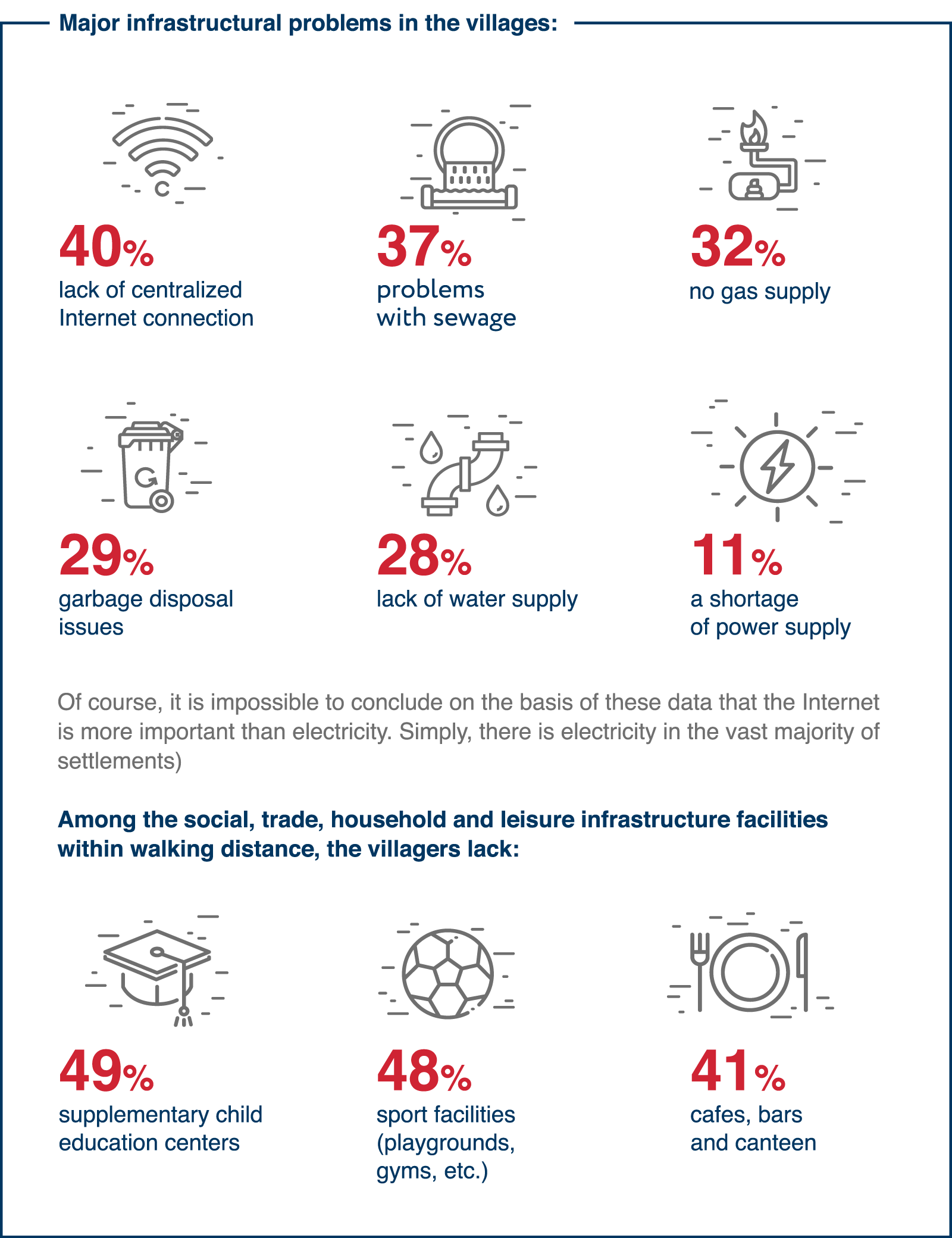 27 The objects of the study were rural residents who are thinking of moving to a permanent place of residence in the city, and city residents who, on the contrary, are thinking of moving to a village. 28 What’s missing in the village? The Civic Chamber of the Russian Federation presented the results of Standard of the Village monitoring //Website of the Civic Chamber of the Russian Federation, 17.07.2018: https://www.oprf.ru/press/news/2018/newsitem/46025.
27 The objects of the study were rural residents who are thinking of moving to a permanent place of residence in the city, and city residents who, on the contrary, are thinking of moving to a village. 28 What’s missing in the village? The Civic Chamber of the Russian Federation presented the results of Standard of the Village monitoring //Website of the Civic Chamber of the Russian Federation, 17.07.2018: https://www.oprf.ru/press/news/2018/newsitem/46025. Source: The Public Chamber of the Russian Federation and the Russian Union of Rural Youth29 The results obtained through Standard of the Village monitoring. The monitoring was conducted by the Civic Chamber of the Russian Federation jointly with the Russian Union of Rural Youth in June-July 2018; more than 3.5 thousand people took part in the survey.
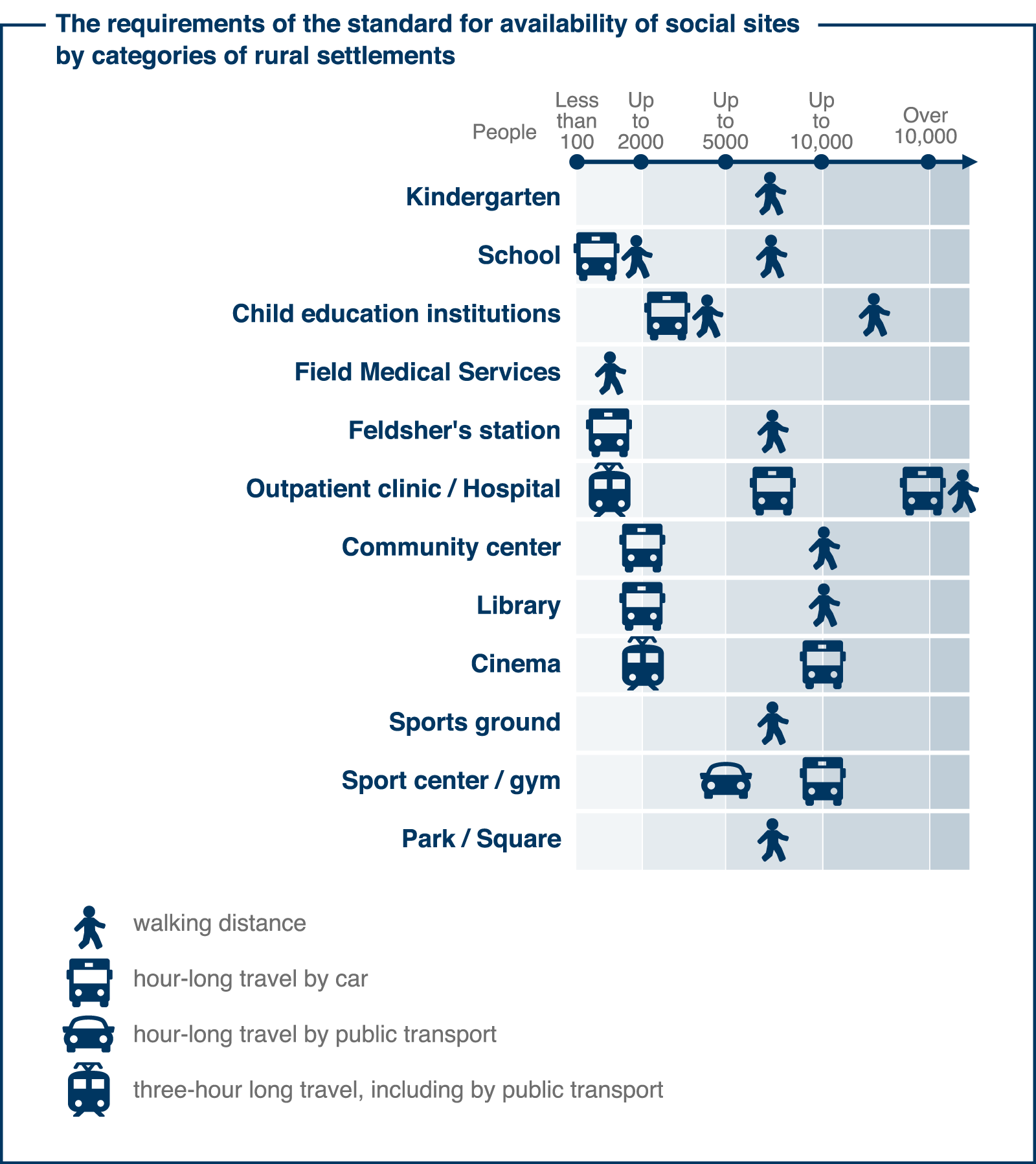
Source: The Public Chamber of the Russian Federation and the Russian Union of Rural Youth30 The results obtained through Standard of the Village monitoring. The monitoring was conducted by the Civic Chamber of the Russian Federation jointly with the Russian Union of Rural Youth in June-July 2018; more than 3.5 thousand people took part in the survey.
In addition to creating the infrastructure, it is equally important to create new jobs in the country. You will often hear that modern agricultural production involves far fewer people than the Soviet collective farms. But this approach does not take into account different circumstances. Today in Russia, agricultural production chains have gaps, for example, breeding work is weak, seed farming is not well developed, there are not enough logistics centers, etc. A full-fledged strategy for the development of the agricultural sector should consist in restoring the fullest possible chain of agricultural production with thousands of industries in small towns and in rural areas. It is important to create conditions for the development of local business through simplified or patent system of taxation. Within the framework of state support for rural areas, it should be possible to issue grants to students of agricultural universities to organize their own business in rural areas.
Of course, it is impossible to stop natural migration flows by a directive, but it is necessary to maintain the existing competitive advantages and new projects in small towns. New non-standard approaches are required. The Smart City31 Project website “Smart City”: http://gorodsreda.ru/umniy-gorod/. project and programs on creation of production zones around the municipal centers, which are implemented in some regions of Russia, are of the utmost interest. Thanks to digital technology, people can work remotely, without leaving their cities in economic centers, for example, the Civic Chamber of the Russian Federation welcomes the initiatives for moving call centers of major companies to small towns. In many countries the largest university campuses are located in small towns.
Not only the economy, but also civil activity allows to revive the territory. Self-organization of local residents, engagement in decision-making is one of the most efficient mechanisms for the development of territories. Famous, proactive budgeting, community foundations are important channels of positive developments in the territories. Thus, in 2018, the Civic Chamber of the Russian Federation acted as an intermediary for the local community and municipal authorities of the city of Tutaev and for the first time in the country applied the practice of the territory co-management.

The municipal governments are the best familiar with local characteristics and realize the development problems of their territory. However, local government is faced with the problem of extremely low economic security. In this regard, the Civic Chamber of the Russian Federation proposes to consider the translation of all special taxes to the local level.
The Civic Chamber of the Russian Federation sees the mainstream development of small territories through building and maintaining competitive advantages with groundbreaking projects. Today, it is important to formulate mechanisms to support such projects throughout the country32 “The problems of small towns is the lack of investment, insufficient attention” — Andrey Maksimov//Website of the Civic Chamber of the Russian Federation, 28.05.2018: https://www.oprf.ru/press/news/2018/newsitem/45554.. The Civic Chamber of the Russian Federation proposes to develop a state program to support enterprises in small cities and rural areas. Each of the twelve national projects to this end should identify specific indicators, as well as prepare the priority national project to support the competitiveness of small territories33 Princes and beggars: how to reduce the income gap? Website of the Civic Chamber of the Russian Federation, 24.04.2018: https://www.oprf.ru/press/news/2018/newsitem/45040..
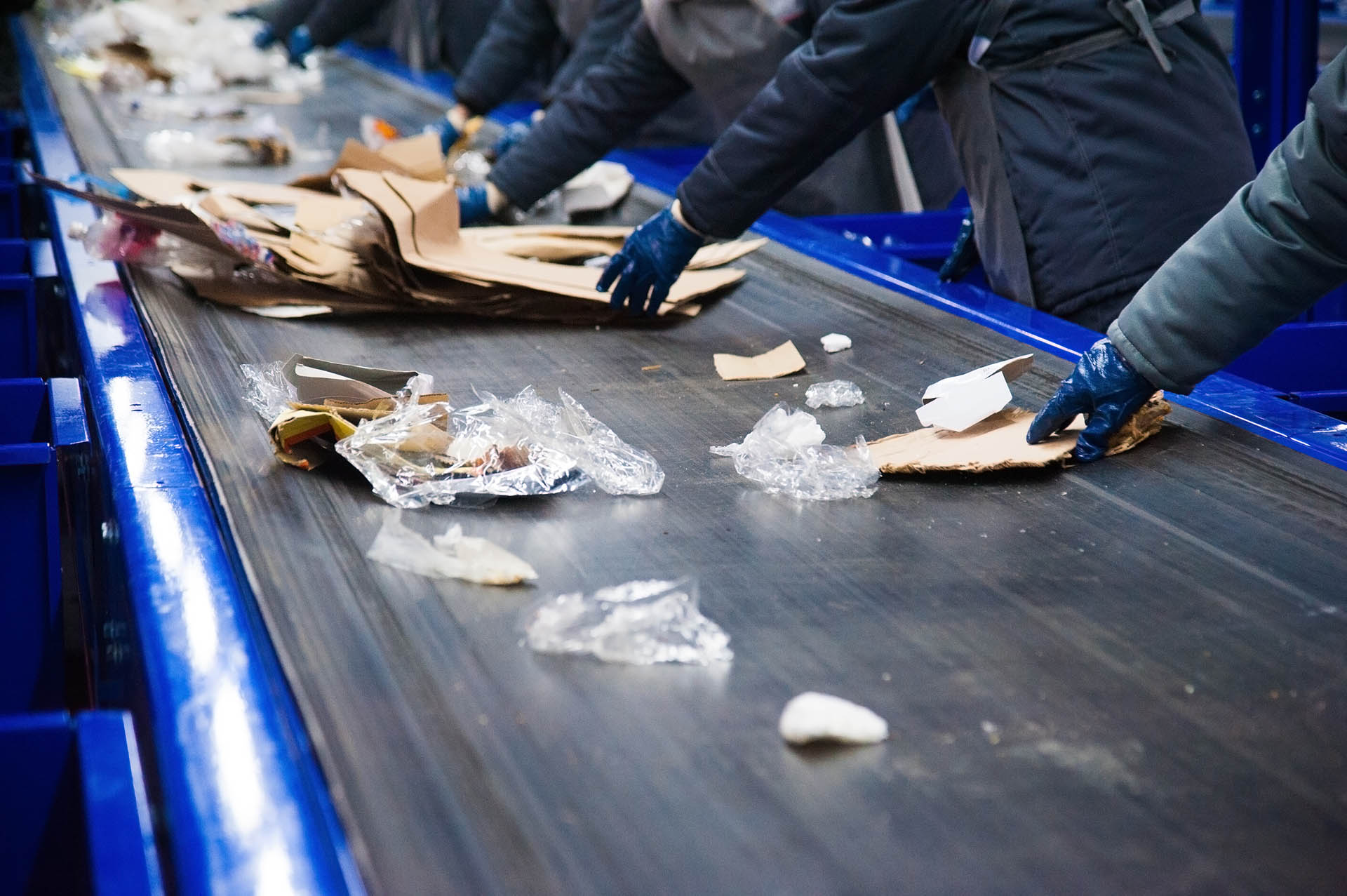
An example of using public competences is situation in the environmental sphere. 2017 was declared the Year of Environment by the President of Russia, but, unfortunately, the Civic Chamber of the Russian Federation has to admit that some issues have not been resolved. There are still water discharges from settlements without cleaning or with unsatisfactory cleaning due to poorly operating sewage treatment plants. In fact, the system of penalties does not work, which should be applied both to owners having treatment facilities on their balance, and to the heads of municipalities and the regions.
The most acute problem in recent years is the disposal of household waste. The absence of a clear strategy of processing led to the uncontrolled expansion of the old and creating new landfills for waste disposal that affected the environment and human health. Therefore, in recent years, the garbage issue has turned from a purely technological into an acute social and political one.
In some regions, people are literally piled with garbage, and their opinion is totally ignored, which leads to the justified discontent and protests. Garbage business is in private ownership and brings high profits to individual companies. It turns out that such business cannot ensure environmental security. In this situation, the state must take responsibility.
But the public outcry surrounding the situation exposed another side of the problem, the lack of adequate competencies and specialized professionals in the executive branch, which could offer a model for the reorganization of the system of collection and recycling of waste. In this regard, the public and expert circles joined the formation of the national project “Environment”: on behalf of the President of Russia, the Civic Chamber of the Russian Federation prepared a report in 2018 “Analysis of the efficiency of measures to ensure the processing of solid municipal waste and proposals to ensure the consideration of the opinion of citizens of the Russian Federation in the construction of facilities used for the processing of the said waste”34 Report on the efficiency of measures to promote recycling of solid household waste and proposals to ensure that the views of citizens of the Russian Federation are taken into account during the construction of facilities used for the processing of waste//Website of the Civic Chamber Russian Federation, 15.10.2018: https://oprf.ru/files/1_2018dok/Doklad_OPRF_othodi15102018.pdf.. The report stated that in our country there is absolutely no waste recycling industry. In fact, it was proposed to create this industry under state control through the construction of high-tech waste processing facilities, the creation of a public law company in the field of waste management and nationalization of landfills.
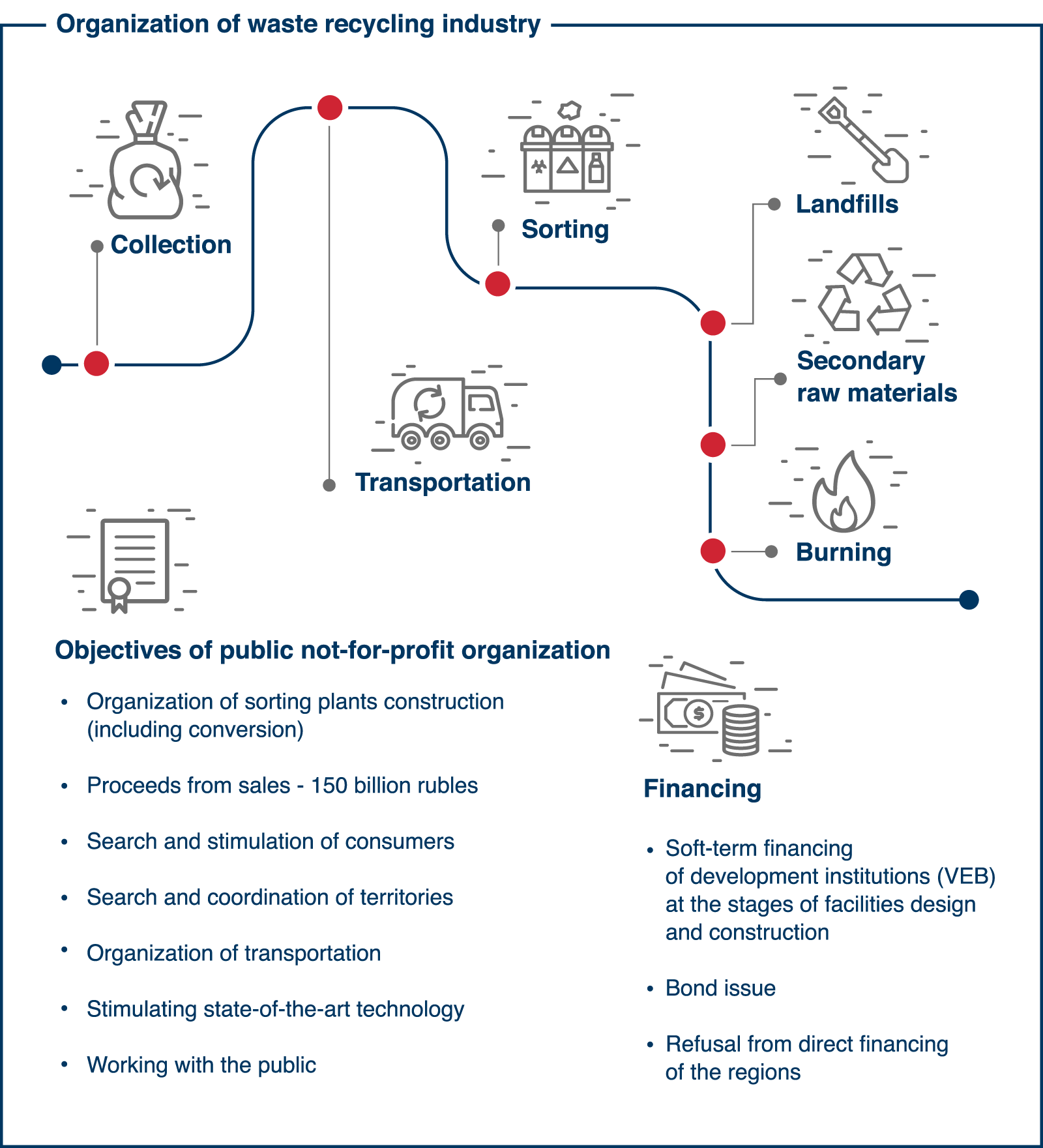
Source: Civic Chamber of the Russian Federation
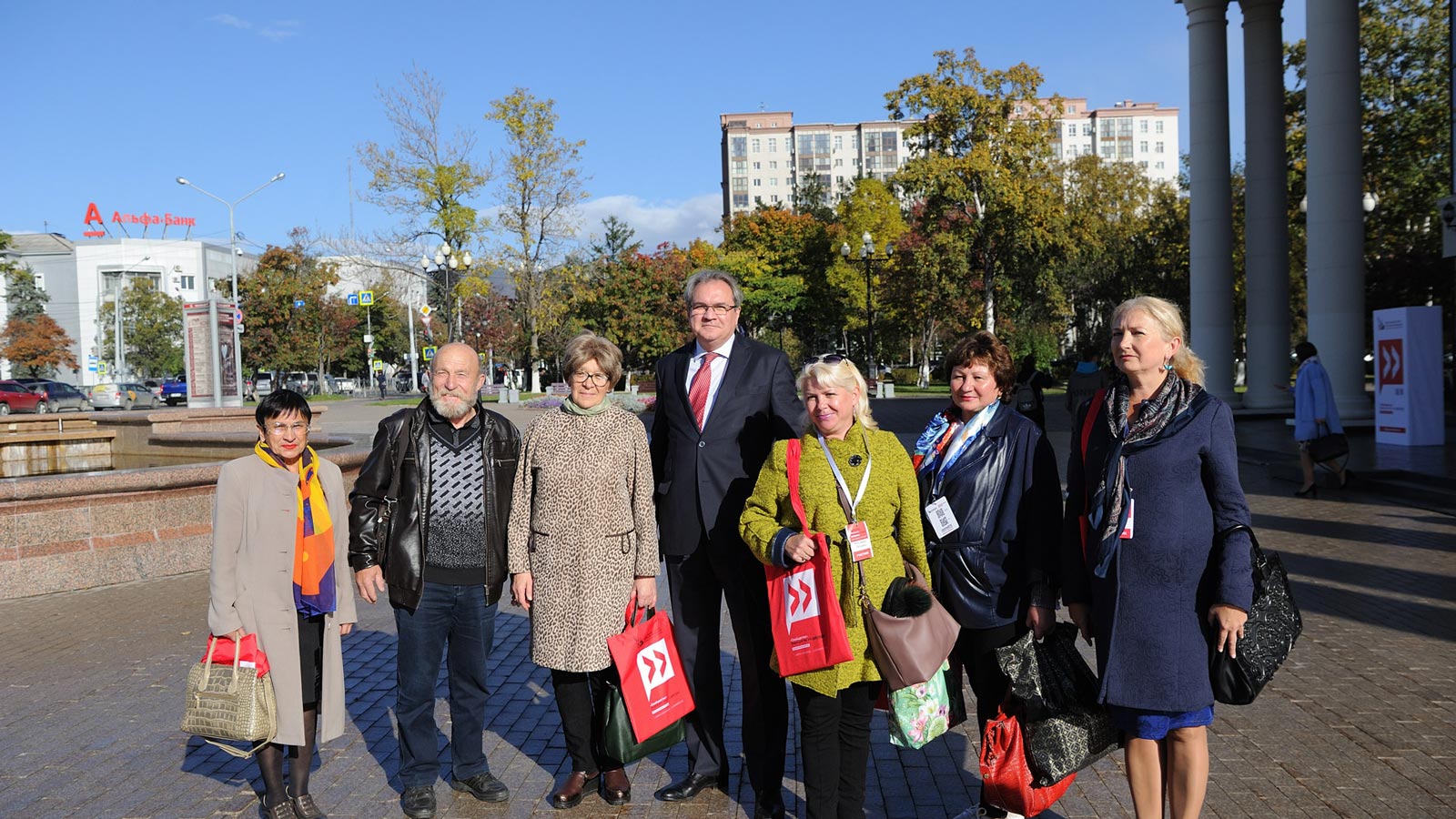
The task of the public law company in the field of waste management is to organize the construction of waste sorting plants, stimulate the introduction of modern technologies and coordinate all work with the population at the local level.
Proposals of the Civic Chamber of the Russian Federation were reflected in the passport of the national project “Environment”. This is a great example of civil society engagement in the governance through enhanced expert competencies of community members or public co-management. It is important that the ideas were implemented.
In 2018, with the support of the Civic Chamber of the Russian Federation, a project was implemented to create an institute of public environmental inspectors35 Become a public inspector in the sphere of environment//Environmental Press Center: http://ecopress.center/page2667908.html.. Anyone who cares about the state of the environment can become a public environmental inspector. You need to register on the site publicmonitoring.ru.
One of the national priorities is the development of the Far East. As Russian President Vladimir Putin said in an article published by the 25th APEC Summit, “it is about creation of growth territories in the region, large-scale development of natural resources and support of advanced high-tech industries, investment in human capital, education and health, in setting up competitive research centers”36 Far East: problems of development and ways of their solution//Website of the Civic Chamber of the Russian Federation, 03.201.2018: https://www.oprf.ru/press/news/2018/newsitem/46767..
Following the results of the Eastern Economic Forum, held on September 11 – 13, 2018, Russian President Vladimir Putin signed an order for the preparation of the national program for the development of the Far East, as well as the implementation of public control over its implementation. Today, however, only five State programs conform to the plans of the advanced development of the Far East, and 24 state programs that do not conform it37 “People should understand why Far East development programs are needed” — Alexander Tochenov//Website of the Civic Chamber of the Russian Federation, 03.11.2018: https://www.oprf.ru/press/news/2018/newsitem/47208.. Many social problems remain unresolved. Here are some examples of problems that the residents of the Federal District said during “Community” Forum in Yuzhno-Sakhalinsk on October 3-4, 2018: Lack of gas supply and hot water in the city, where there is a plant for the production of liquefied natural gas; high prices for flights from Sakhalin to the mainland, as flights to Sakhalin are subsidized, and flights back are not; shortage of branches of Sberbank and Russian Post in small towns of the Far East, etc.38 Civic Chamber Forum opens in Yuzhno-Sakhalinsk// Site of Public Television of Russia, 03.10.2018: https://otr-online.ru/news/v-yuzhno-sahalinske-otkrylsya-forum-obshchestvennoy-palaty-112286.html.
Pursuant to the instructions of the President, the Council of Civic Chambers of the Subject Regions of the Russian Federation was created in the Far East Federal District39 Civic chambers will participate in the preparation of the national program for the development of the Far East // Website of the Civic Chamber of the Russian Federation, 01.11.2018: https://www.oprf.ru/press/news/2018/newsitem/47170.. The council included heads of regional civic chambers of the Far East Federal District and members of the Civic Chamber of the Russian Federation from the Far East District regions, the coordinator was Vladimir Ikonnikov, Chairman of the Public Chamber of Sakhalin Region. The main task of the council will be to discuss the relevant issues of the socio-economic development of the Far East region and develop proposals for their solution, engagement in the preparation of the National Program for the Development of the Far East and public control over its implementation. Thus, the sites of regional chambers become collection points of the relevant problems of the socio-economic development of the Far East region, they will adopt proposals for their solution, and also become platforms for ensuring the interaction of citizens, organizations and public associations with the government bodies in the Far East.
A section on the situation in the fishing industry was organized at the “Community” Forum in the Far East Federal District. Our country has the largest fish resources, but the consumption of fish products is falling and no longer even meets Russian standards: in 2017, fish consumption was 14.6 kg per person, which is 3.4-7.4 kg less than the consumption rate established by the Food Safety Doctrine of the Russian Federation40 Evaluation of the Association of industrial and commercial enterprises of the fish market.. The main reason is that the prices on fish products in recent years rose more than twice fold due to more favorable conditions created for the export of fish products than for its supplies to Russia. For example, during the export of fish products VAT is returned, unlike when they are shipped to Russia, the price of fish products is pegged to dollar and is delivered to Russia at prices of international fish exchanges and auctions, therefore the people of Russia, for the most part, are not willing to buy fish products, and processing enterprises refuse to take them for recycling. Yes, you can refer to the laws of the free market, but the main thing is missing from the point of view, that is the quality of life of our citizens.
In 2018, the Civic Chamber became focused on this issue, specific proposals were developed, the most important of which was to give the tax rate for the extraction of aquatic biological resources the functions of economic incentives for businesses to supply fish to the Russian coast. For this purpose it is necessary to increase the amount of basic salary up to 20% of the market price of fish products of low processing degree. It is also proposed to provide incentive discounts from the base rate for catching aquatic biological resources depending on the processing area – in case of export of fish products of low processing degree, not to provide any discounts from the base rate, and in case of delivery of low processing degree products to the Russian processing plants with subsequent sales of fish products in Russia, provide a discount of 85% of the base rate for the catch of aquatic biological resources.
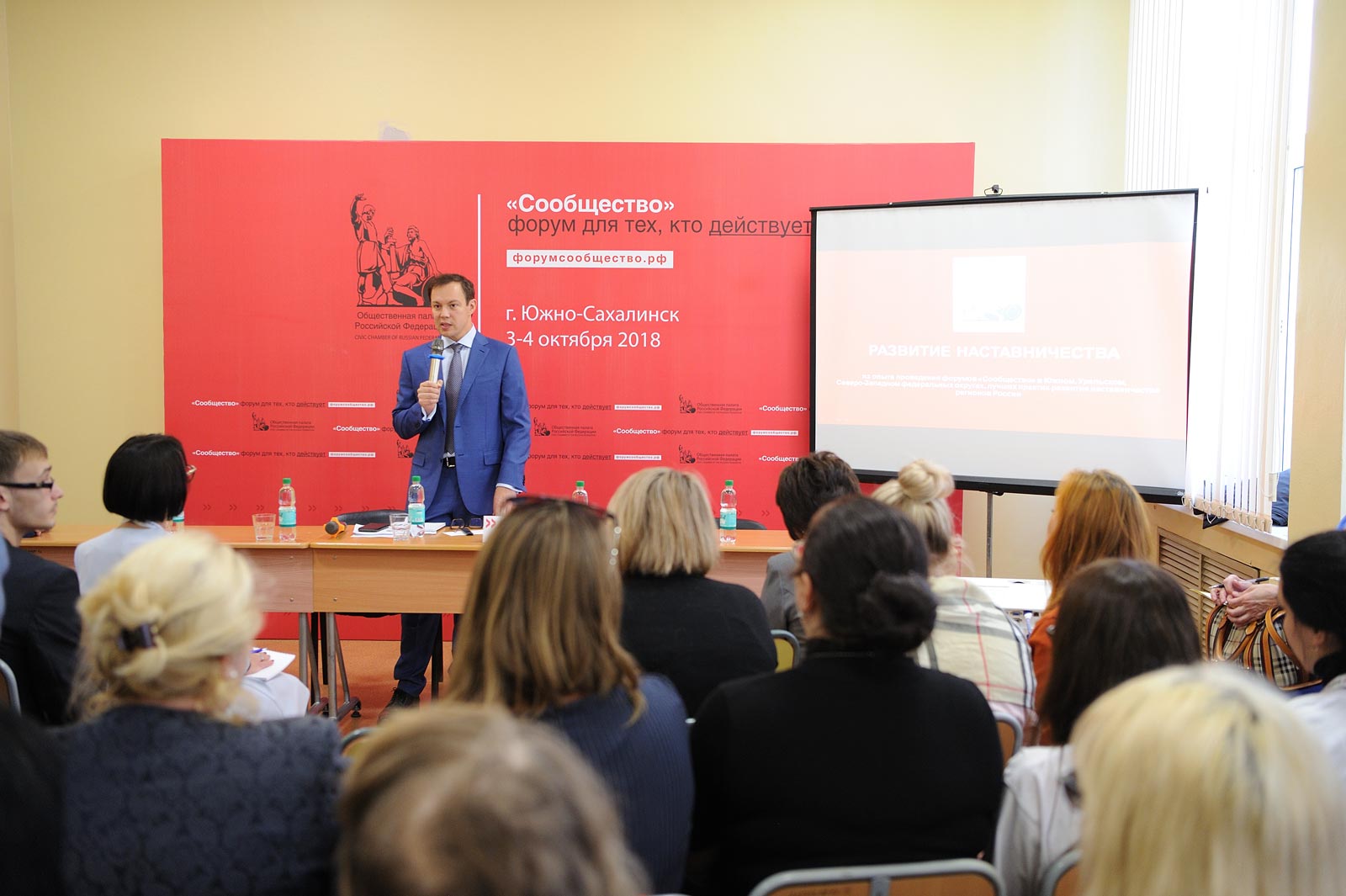
Thus, the sites of regional chambers become collection points of the relevant problems of the socio-economic development of the Far East region, they will adopt proposals for their solution, and also become platforms for ensuring the interaction of citizens, organizations and public associations with the government bodies in the Far East.
In recent years, the incidence of cancer in our country is constantly growing. About 300 thousand people in Russia die from cancer every year, the quality treatment is inaccessible for many patients. The issue of combating cancer is highlighted in the Decree of the President of Russia. But this issue also cannot be dealt with without engagement of civil society. The Website of the Civic Chamber of the Russian Federation, as part of the All-Russian Congress of Oncological Patients, managed to bring together doctors, patients, and community activists. The main thing that was noted: if treatment has improved in recent years, things are much worse as far as the diagnostics and rehabilitation are concerned. It is clear that the earlier the disease is identified, the higher are the chances of recovery. Specific proposals were developed at the Website of the Civic Chamber of the Russian Federation.
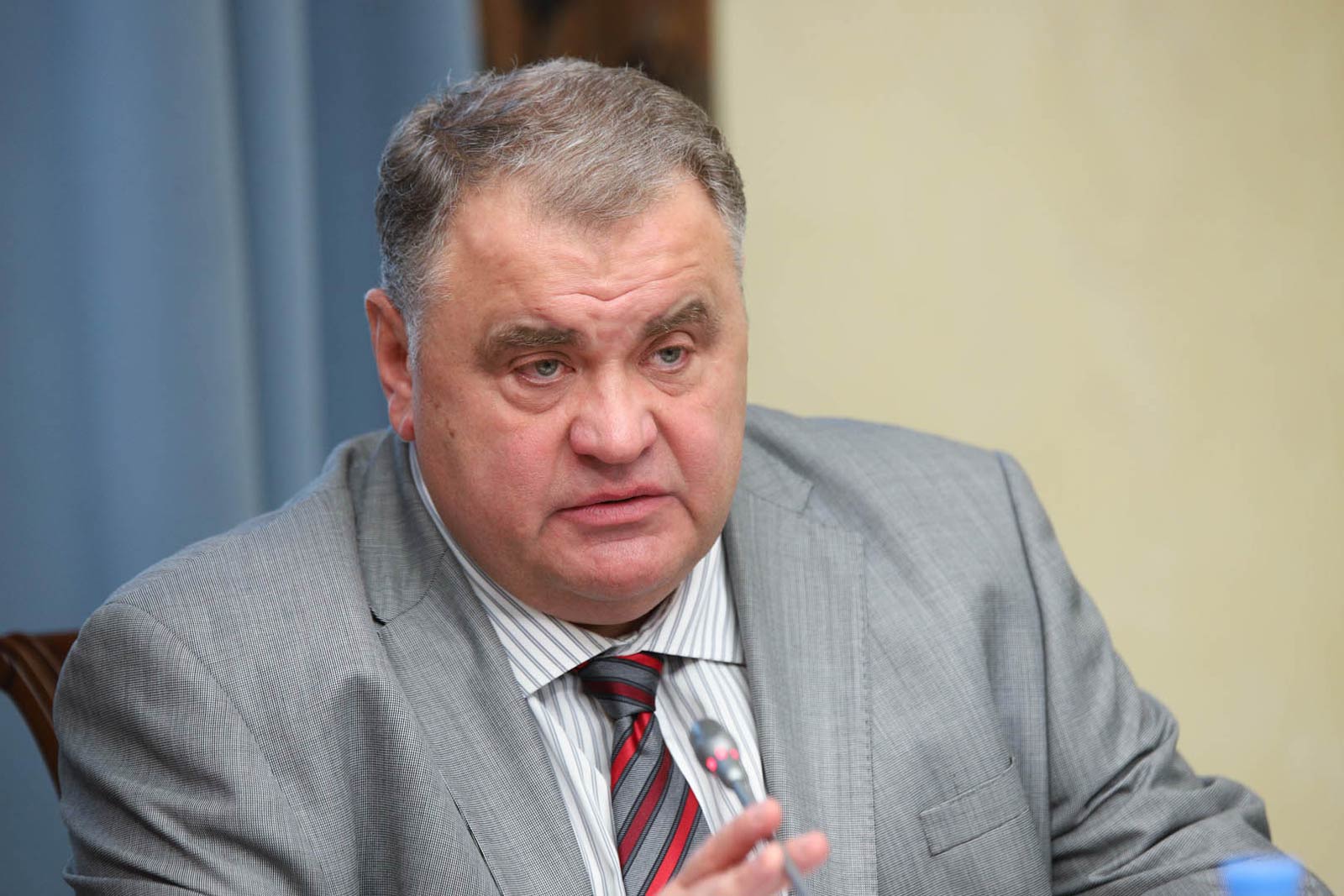
First: the so-called cancer alertness. All the doctors, including specialists, should focus on identifying cancer risks. The whole country was shaken by a sad case in Apatity. During a live TV call-in with the President, a young woman named Daria Starikova, who was sick with cancer, addressed for help. They tried to help her, but it was too late. Daria died. And why? She was treated from another disease. The consulting physician didn't even think about cancer.
Second: the promotion of regular examinations among the population, and the efforts of community activists should be supported – a number of NPOs throughout the country effectively advocate the necessity of such examinations.
Third: multidisciplinary approach. The efficiency of treatment increases, when the patient is attended by a team of doctors - specialists in various fields: chemotherapists, radiologists, surgeons.
This concept, created jointly by the medical community, patient organizations and governments, has a chance to become effective, precisely because it was adopted by joint efforts.
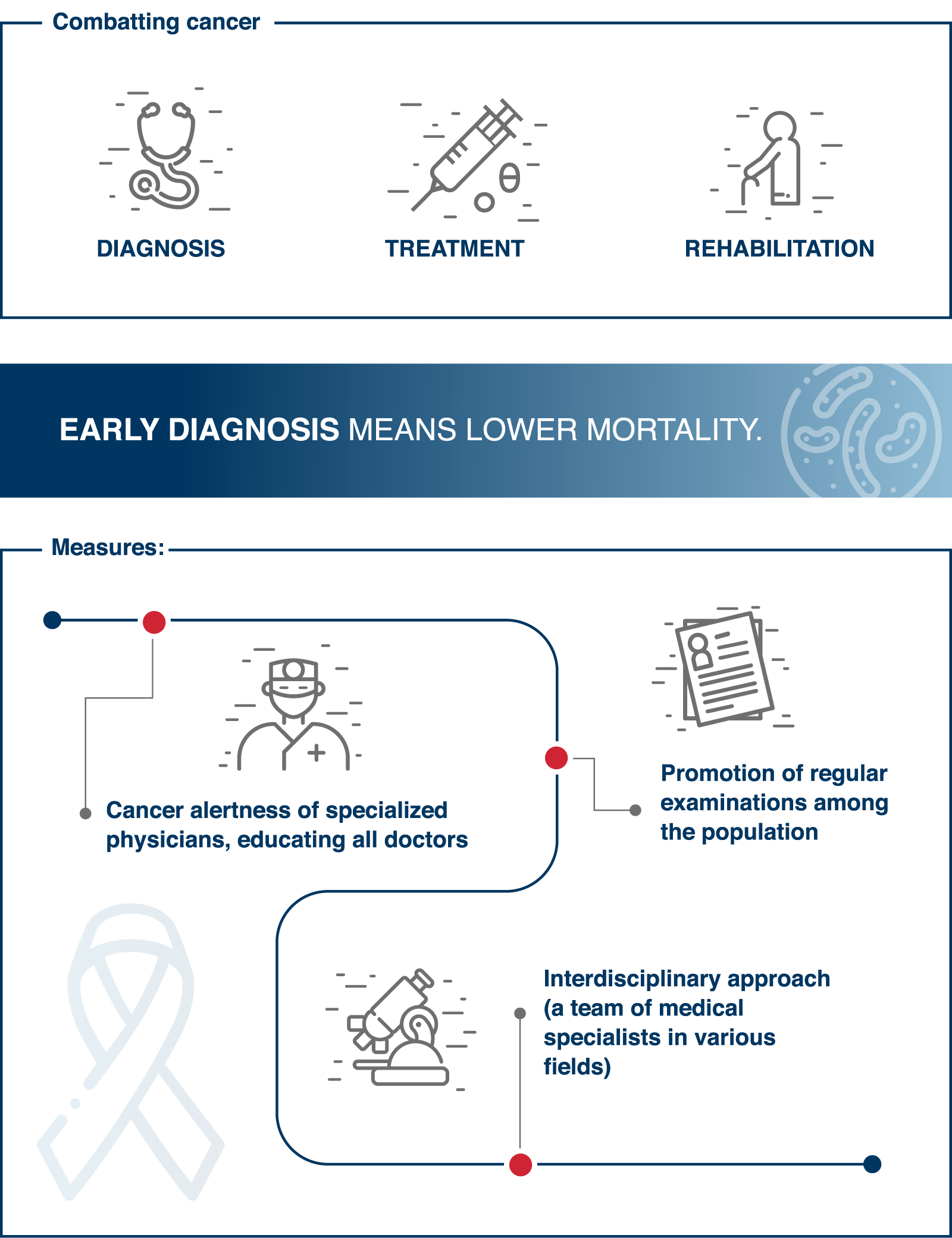
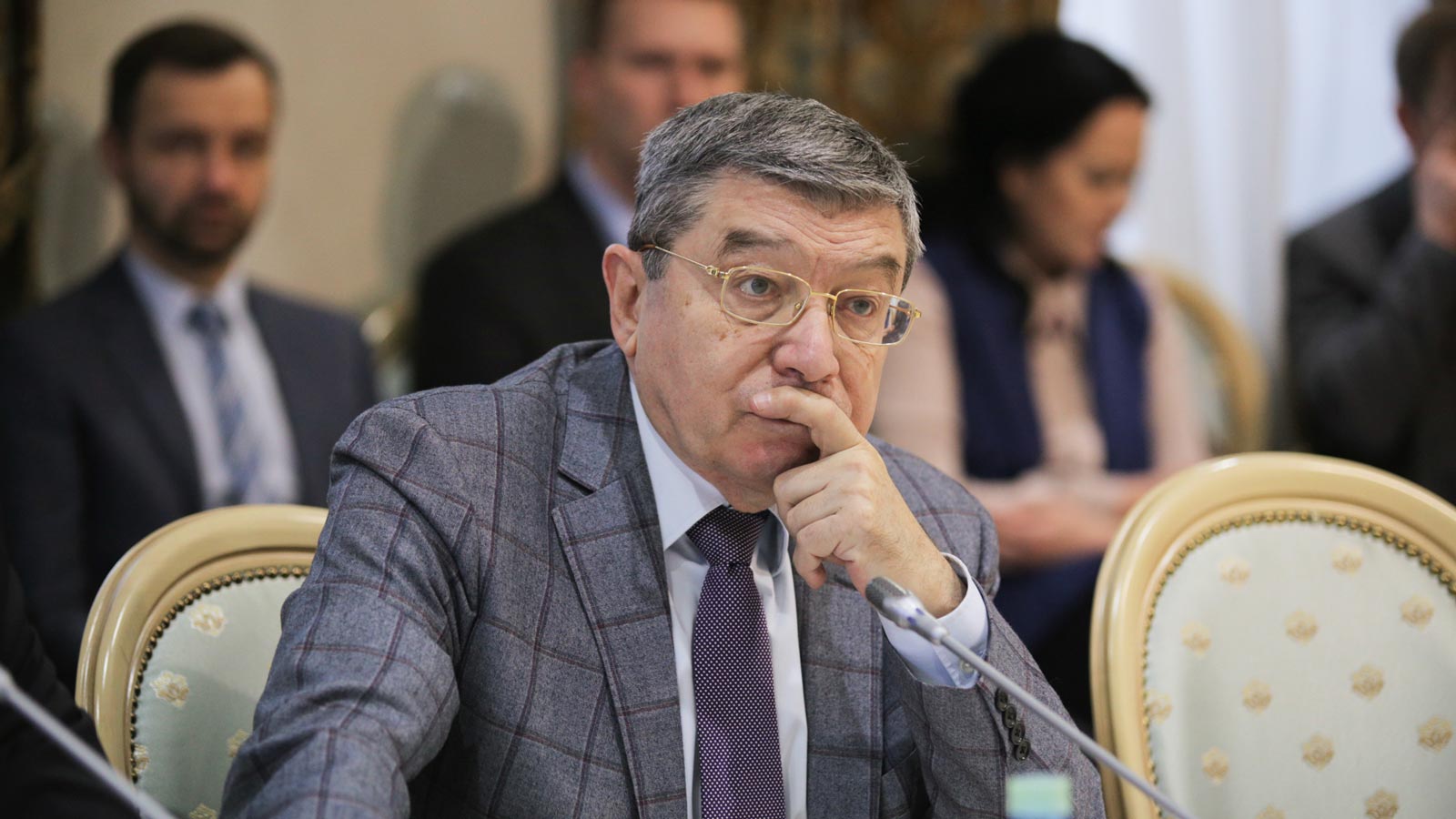
While summing up the results, it should be noted that while ensuring the “Russian breakthrough” and further reforming the country, we should move to an “understanding state” model based on the idea that it is necessary to carry out a preliminary assessment of the impact of reforms, taking into account public interests. Only through dialogue with citizens one can build confidence in the widest layers and groups of Russian society that the state hears, understands their requests and is ready to respond to them. Therefore, any large-scale reforms should be based primarily on the interests and values of citizens, it is on this basis that it is necessary to formulate the strategic goals and objectives of development and to consolidate society.